The Power of Education: Sakena Yacoobi’s Hopes for the Women of Afghanistan
Posted on December 6, 2012.
By Nina Carduner
Photo credit: Rodrigo Valenzuela
Dr. Sakena Yacoobi, founder of the Afghan Institute of Learning, opened this year’s Global Washington conference with an impassioned retelling of her experiences working to bring education to the women and children of Afghanistan.

She described her own childhood in Afghanistan as happy and secure. They were poor, she said, but able to sufficiently provide for what they needed in their own country. She described a life where women and children could freely go from place to place, visiting neighbors and celebrating various holidays with other families. But now, the people of Afghanistan have been traumatized by forty years of war.
While completing her education in the US, she had supportive teachers, the ability to ask questions, and freedom of speech. But when the Shah invaded, she could not return home and her family became refugees. Still, she explained, her heart never left Afghanistan and she began a career in public health, remembering how few resources there were for maternal and child health was when she was growing up.
On a trip to an Afghan refugee camp, she was shocked by what she witnessed. She met women who had lost everything: their fathers, husbands, and brothers. They were left helpless and completely unable to do anything for themselves. “They were like animals. They felt less than human,” she explained. That’s when she realized that education was the solution to helping these women.
At that time, many Afghan refugee camps were in Pakistan, and she began going camp-to-camp to offer education. Many of the mullahs in the camps believed that education was not good for children, but over time, she convinced the mullahs to became teachers. In one year, the number of students she reached went from 300 to 27,000. Education in the camps was not just a critical need, but a clear desire for the refugees. But this presented a new problem, she went on. When children are traumatized by war, have never been educated before, and are mixed with other children of all ages, it can be very difficult to motivate them to come to school. She created a curriculum that would challenge these children and emphasize critical thinking skills.
When the Taliban took over Afghanistan, schools were closed and women could no longer go out freely by themselves. Dr. Yacoobi knew she had to do something to bring her curriculum to the children of Afghanistan, but understood the risk and danger she was bringing on herself and colleagues. Through various creative methods, they were able to secretly open 80 underground schools. They also risked their lives to set up a mobile library traveling from school to school, hiding the books in sacks of flour and rice with three men acting as male relatives. Every time they traveled with the mobile library, she didn’t fear death but feared getting caught by the Taliban would mean the end of the entire program. Each class was only supposed to support 35 students, but they attracted over 75 students to every class. It was clear that Afghans would risk certain danger to educate themselves and their children.

Today, her schools teach over 3,000 students in rural Afghanistan and have reached 10 million people with a variety of health services, in addition to education. Their teachers receive training, materials, and salaries. The children her organization has educated have now grown up and can be seen in all levels of Afghani society. When people ask Dr. Yacoobi how she has done this work for the last twenty years, she always responds, “I love my country. I love my people . . . the Prophet told us in the Qur’an that women and men can learn side by side and they can be anything they want to be.” The women who benefited from her programs are also more empowered today because they aren’t just seeking basic education; they are also pursuing higher education. She continued, “the women of Afghanistan are not the same women they were five years ago. They have been oppressed for forty years, and now with education, they will not accept the treatment they experienced in the past. When children have mothers who are no longer helpless, they will succeed.”
Dr. Yacoobi closed, “if the tank and the gun didn’t solve our problem, I am 100% sure that the women of Afghanistan will.”
Secretary Clinton praises $1 billion hunger pledge by InterAction members
Posted on November 1, 2012.
At an event held alongside the United Nations General Assembly, Secretary of State Hillary Clinton gave praise and recognition to InterAction and its members for their continuing work to fight global hunger. Clinton also announced that an alliance of 198 U.S.-based organizations have pledged more than $1 billion of private, non-governmental funds over the next three years to improve food security and nutrition worldwide. “Global hunger is one of the most serious challenges facing our generation, but a strong commitment by organizations such as our members and the political will of governments can make a huge difference in tackling this problem,” said Sam Worthington, president and CEO of InterAction.
Through the support of thousands of smallholder famers and the sponsorship of more self-sufficient communities, InterAction’s members emphasize efforts that will provide better, more reliable nutrition for children. By providing the necessary skills and tools, farmers can produce healthier livestock and more nutritious crops, benefiting both the farmers and the local communities as a whole.
A strong commitment from both organizations and governments is needed to improve global health and fight under-nutrition. As Worthington pointed out on Thursday, InterAction’s members compliment the efforts of U.S. Government programs, such as Feed the Future. “NGOs’ private resources and strong local links complement the efforts of the U.S. government and others to meet development goals worldwide.”
The Obama administration is also looking to further their commitments and objectives in the field of global development. On September 22, 2012 President Obama, without precedent from any prior U.S. administrator, signed a Presidential Policy Directive on Global Development. The recognition of a global future, which focuses on American strength through development and diplomacy, is one important step towards a just and sustainable international order. In this policy directive, President Obama pledges to focus U.S development efforts in a way that will maximize the impact of investments and policies, focusing on broad-based economic growth and democratic governance. The United States will,
- Elevate broad-based economic growth as a top priority, ensuring that our investments and policies are guided by rigorous assessments of what the U.S. can do to help countries achieve sustainable growth.
- Increase the focus of resources, policy tools, and engagement in support of select countries and sub-regions where the conditions are right to sustain progress.
- Use U.S. leadership in the multilateral development banks, U.N. agencies, other international organizations, other donors, foundations, nongovernmental organizations, the private sector, and other stakeholders to deploy the full range of our development tools and policies at our disposal.
With the upcoming election fast approaching, the international community must take the initiative to know and understand the direction of U.S. foreign policy. The recognition of global strength and prosperity must be fully realized no matter who represents the United States following this election season, and the relationship between the government and the non-profit sector must continue to flourish. With increased cooperation and understanding between NGOs and the government, global development goals can be achieved more efficiently and effectively, a sentiment that was expressed by both Secretary Clinton and InterAction president and CEO, Sam Worthington.
For more information on InterAction and its members go to http://www.interaction.org/, and for the Fact Sheet: U.S. Global Development Policy in its entirety go to http://wh.gov/iLb.
October 2012 Newsletter
Posted on October 24, 2012.
Welcome to the October 2012 issue of the Global Washington newsletter. If you would like to contact us directly, please email us.
IN THIS ISSUE
Note from our Executive Director
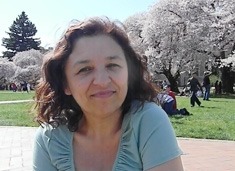 Greetings,
Greetings,
Our staff and planning committee are keeping busy putting together final details for our 2012 Annual Conference, Redefining Development: From Silos to Collective Impact. We are focusing in on the most important elements of the conference to make the time spent this year as valuable as possible—2012’s Conference has a lower price for one full day of sessions and networking. We hope this will make it easier for many more of you to participate than ever before!
We are excited about so many elements of the conference this year, but to name a few: 1) Our new Seattle location at Bell Harbor. 2) More opportunities to connect and network with your peers. 3) A “future leader’s scholarship” so more students can attend and 4) Mini breakout sessions with experts offering advice on specific topics like finances, fundraising, social media and more. We are also offering a special group discount for organizations that register five or more employees! Email admin@globalwa.org to learn more about these opportunities, or visit the conference page of our website.
If you can’t wait until December to connect with Global Washington and your global development friends and colleagues, we have two wonderful salons in our GlobalWA//Gather series coming up in November. The first event will take place on November 1st, 2012 and features Deo Niyizonkiza, founder of Village Health Works and subject of the New York Times best seller Strength in What Remains. The second will be on November 13th and will feature Lama Tenzin, Buddhist Monk who founded an orphanage called the Children’s Educational Development Society.
We hope to see you at one or both of these great salon events, as well as our Annual Conference in December!
In unity,

Bookda Gheisar, Executive Director
Back to Top
The Marine Stewardship Council
Harnessing market forces to preserve our oceans
By Megan Boucher
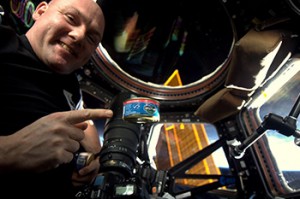
Photo credit: ESA/NASA
Dutch astronaut André Kuipers onboard the International Space Station (ISS) posted this photo of a floating can of MSC certified Alaska salmon to Flickr.com with the message: “Lots of ocean, but there’s still overfishing and destruction of marine life. Sustainable fish is an alternative. Even in space we eat MSC-certified fish”.
The common ground between industry, environmental groups, government, and consumers is not ground at all, but rather water. The wellbeing of our oceans, particularly the preservation of ocean resources and seafood stocks, is a topic that diverse groups agree is crucially important. It is in this space—between environmental preservation and sustainable business—that the Marine Stewardship Council (MSC) exists.
In many sectors, big business and conservationists are at odds with each other, but through MSC they work harmoniously together. In fact, MSC was born out of a joint effort between the consumer goods giant Unilever and the World Wildlife Fund, two disparate entities that realized that the depletion of ocean resources was detrimental to both business and the planet.
MSC is harnessing market forces to transform the seafood market to a sustainable one. Its objectives are fourfold: protect ocean resources by transforming the market to a sustainable one; reverse declining fish stocks; preserve the livelihoods of the half a billion people globally who depend on seafood for survival; and contribute to food security by ensuring fish, which is a critical source of protein for much of the world, is a renewable food resource. MSC accomplishes this through a rigorous certification program for fisheries. The MSC sustainability standard is the most trusted in the world, developed with the help of hundreds of scientists, industry members, and conservation organizations. Additionally, MSC has created a traceability standard, which ensures that any product carrying the MSC label can be traced back to a certified, sustainable fishery. This high level of accountability increases consumer confidence in the food they purchase with the MSC label.
The process starts when a fishery decides to pursue MSC certification. In order to keep MSC, as the standard setter, neutral in the process, fisheries select from independent accredited assessors to ascertain who evaluates them against the MSC standard. The fishery works with a certifier and assessment team to evaluate three main areas: health of stock, impact on marine ecosystem, and management.
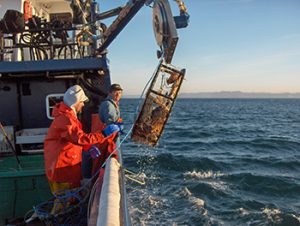
Catching Oregon Dungeness crab.
The process is thorough and transparent, taking an estimated 12-15 months. The assessor identifies stakeholders in a fishery, who are invited to participate and comment on the process. The initial report goes out for public comment and is reviewed by independent scientists. Comments and feedback are incorporated into the final report, which is held for 15 working days in case anyone wants to file final objections. At the end of the process, if the fishery meets the MSC standard, it is certified and can put the MSC label on its seafood–a label that consumers increasingly know to look for and trust.
Although consumer assurance is important, the industry itself is really the driving force behind the sustainability effort. “When I first got engaged in the MSC program, I thought it would already be consumer driven,” said Kerry Coughlin, Regional Director for MSC Americas and Russian Far East. “But it is really the industry that has been the start—they have really stepped up and felt the need to preserve the resource. They’ve embraced sustainability, even if their consumers weren’t as educated about it.”
MSC has seen huge successes in the number certified fisheries and those that are moving towards certification, with 288 fisheries worldwide engaged in the process. About 50% of the seafood harvested in the United States is MSC certified. Large retailers like McDonald’s and Walmart are pushing the movement forward, making public commitments to sustainability that will require their suppliers to either get certified or lose business. The momentum is contagious.
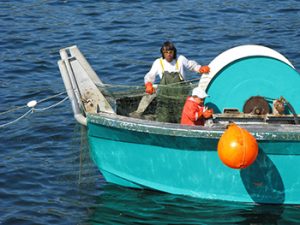
The first fully tribally managed fishery in the MSC program is the Annette Islands salmon fishery in SE Alaska managed by the Metlakatla.
However, MSC’s work goes beyond big business and the environment and closely impacts the lives and livelihoods of people in the developing world. Marine-based food is a crucial source of nutrition for many and fishing an important source of income. Without sustainable fish stocks, many would lose their jobs and many more would lose a key food source. For this reason, the MSC model is strongly embraced in the developing world and entire communities are impacted by preservation efforts.
The first fishery in the developing world that became MSC certified was subsequently studied by a Harvard graduate student who looked at MSC certification’s impact on that community. The study found surprising results that were not even directly related to fish. The certification elevated the status of the fishery, making it a more viable player in the global marketplace. As a result, the government paid more attention to the community, which soon acquired more resources like health clinics, better sanitation, and paved roads. The MSC recognizes the developing world as an important market for sustainability certification and has already worked with many local industries, including a hand-gathered clam fishery in Vietnam, and fisheries in Africa and South America.
MSC’s Developing World Program is growing but is also a particular challenge. The MSC standard is harder to meet in the developing world, as these fisheries often lack the resources and level of organization or data necessary to make improvements or even provide the data necessary for the certification process. Nevertheless, MSC recognizes that sustainability in these fisheries is an important component of global sustainability and global livelihoods. MSC is currently exploring how to tap into existing financing and investment strategies to help these interested fisheries complete the certification process.
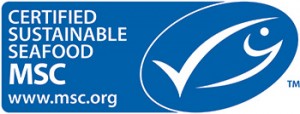
The MSC ecolabel helps consumers recognize MSC certified seafood when they shop.
MSC’s work requires close collaboration with nonprofits, governments, and businesses to achieve its mission, and believes strongly in marketplace solutions to achieve results. One of Coughlin’s favorite examples of this model in action involves the Patagonian toothfish (also known as Chilean Seabass). Just a few years ago, due to excessive illegal, unregulated and unreported (IUU) fishing, the toothfish’s survival was in danger and there was extreme conservation pressure to pull the fish off of menus and retail shelves. One fishery came forward and decided to become MSC certified. Undaunted by the certifier’s initial assessment of their numerous problems, they set about to make the necessary improvement to become sustainable. They eventually achieved certification to the rigorous MSC standard and earned their way back into the tenuous marketplace. In order to compete, other fisheries followed their example. Now, just a few years later, 50% of the toothfish industry worldwide is certified or on the path to sustainability. “Those kinds of results,” said Coughlin, “Would be hard to accomplish through regulation and advocacy alone.”

A box of MSC certified seafood
With its headquarters for North and Latin America and the Russian Far East in Seattle, the Marine Stewardship Council recently joined Global Washington and is looking forward to connecting with members of Washington’s global development community. “Our work is all about the environment” said Coughlin, “But going along with that we are working to preserve economies and livelihoods, and increase food security. We’re very interested in our many partnerships and what together we are doing in those types of programs and learning from them.” They are particularly interested in how other organizations approach marketplace solutions– taking private or public capital and turning it into economic development. “We can’t support our base without it but there’s not enough philanthropy n the world to do what we’re all trying to do,” Coughlin insisted. “You have to have organizations harnessing these forces and working on these issues. But as far as actually making it happen, you have to get market forces and get the market place engaged to bring about sustainable change.” MSC is a wonderful example of using partnerships to achieve a shared goal—NGOs, businesses, governments, and consumers can all help preserve critical ocean resources. Coughlin was adamant that this is a joint effort: “We’re turning around the trend lines on world fisheries. And by we, I mean all of us together.”
Back to Top
Changemaker
Dave Richter
By Anna Jensen-Clem
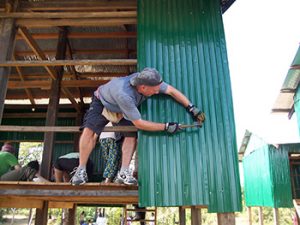 “As you look for solutions for one problem, you come up against the next challenge.” This is perhaps the most succinct way to explain Dave Richter’s varied, trans-continental professional career. As a child, Richter spent his days tracking his father’s travels across the globe. A Project Evaluator, and later Deputy Director in Kenya for the Peace Corps, Richter’s father traveled frequently, and his children were quickly instilled with a sense of a world outside their own front door. This awareness has guided Richter’s professional life ever since. From his elementary education in Kenya to his post-collegiate study of Chinese in China and Taiwan, Richter has sought solutions to puzzles, answers to difficult questions, and acknowledgement of a common human purpose for all of us.
“As you look for solutions for one problem, you come up against the next challenge.” This is perhaps the most succinct way to explain Dave Richter’s varied, trans-continental professional career. As a child, Richter spent his days tracking his father’s travels across the globe. A Project Evaluator, and later Deputy Director in Kenya for the Peace Corps, Richter’s father traveled frequently, and his children were quickly instilled with a sense of a world outside their own front door. This awareness has guided Richter’s professional life ever since. From his elementary education in Kenya to his post-collegiate study of Chinese in China and Taiwan, Richter has sought solutions to puzzles, answers to difficult questions, and acknowledgement of a common human purpose for all of us.
As an undergraduate student at Swarthmore College, Richter immersed himself in the study of Chinese history and language, and in 1980, he traveled to China to study. On returning home, he received an M.A. in International Relations from the Johns Hopkins School of Advanced International Studies (SAIS). He then embarked to work in China for the next few years, shuttling back and forth with the US-China Business Council in Beijing and Washington, DC. In 1992, he began working for Asia Emergency Assistance in Beijing, managing medical evacuations and coordinating the logistics of transport, equipment, and people. Building a clinic in Beijing and making sure that foreign visitors and expatriates got the medical assistance they needed was, in Richter’s view, a way to do business and help people at the same time. This merger of ideas “resonated” with him and helped to set him on his current humanitarian path. In 2002, he founded Richter International Consulting, based in Issaquah, WA, and helps large companies coordinate the specifics of their insurance and medical and security assistance programs. Helping clients draft comprehensive insurance programs that provide the highest quality care is another in a long string of puzzles Richter has set out to solve.
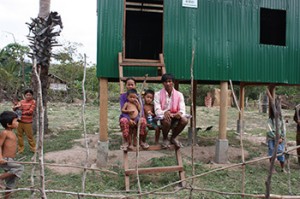

When asked about the benefits of being based in Washington State, Richter listed the innumerable organizations working in global health, the broad client base, and the multiple sources of volunteers as only a few reasons why he chose to remain in the area when starting his own business. He joined Global Washington in 2011, and has since attended a number of events and discussions; the “confluence of speakers” at last year’s conference was one of the most impressive parts of the organization, he says.
Tabitha Foundation:
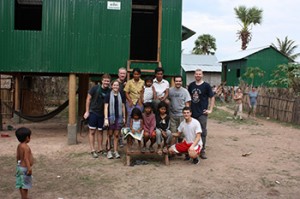 Richter first became involved with the Tabitha Foundation in 2004, and described his first experience building houses in Cambodia as “like coming home.” The work, he says, is what he “was meant to do.” Richter has led building trips to Cambodia each year since then, and his children have traveled to Cambodia four times each. Tabitha has several different projects, and each has developed as an organic offshoot of an earlier project. Initially, the founders began Tabitha as a savings program; one of the most devastating outcomes of the Pol Pot regime was that ordinary Cambodians lost their sense of a future. Few people saved money or even held out hope that they would live to see the next day. This “lingering trauma of disbelief of the future” has prevented many Cambodians from rebuilding their lives even after the Khmer Rouge’s downfall. One of Tabitha’s initial goals was to reinstate that sense of hope and trust in the future through a microsavings program. Rather than save up to buy land or even a television, people in remote villages set aside a few cents per week to buy dishes, fishing nets, or cooking pots. Janne Ritskes, Tabitha’s founder, also set up a cottage industry for Cambodian women, reviving a traditional art in producing silk and giving them an outlet to sell their products. Since many women have small children and cannot always afford to leave the house all day, and because employment opportunities for women in Cambodia are frequently limited, job training for women in remote villages is crucial to their survival. Women employed in the cottage industry support themselves and their families through their skills.
Richter first became involved with the Tabitha Foundation in 2004, and described his first experience building houses in Cambodia as “like coming home.” The work, he says, is what he “was meant to do.” Richter has led building trips to Cambodia each year since then, and his children have traveled to Cambodia four times each. Tabitha has several different projects, and each has developed as an organic offshoot of an earlier project. Initially, the founders began Tabitha as a savings program; one of the most devastating outcomes of the Pol Pot regime was that ordinary Cambodians lost their sense of a future. Few people saved money or even held out hope that they would live to see the next day. This “lingering trauma of disbelief of the future” has prevented many Cambodians from rebuilding their lives even after the Khmer Rouge’s downfall. One of Tabitha’s initial goals was to reinstate that sense of hope and trust in the future through a microsavings program. Rather than save up to buy land or even a television, people in remote villages set aside a few cents per week to buy dishes, fishing nets, or cooking pots. Janne Ritskes, Tabitha’s founder, also set up a cottage industry for Cambodian women, reviving a traditional art in producing silk and giving them an outlet to sell their products. Since many women have small children and cannot always afford to leave the house all day, and because employment opportunities for women in Cambodia are frequently limited, job training for women in remote villages is crucial to their survival. Women employed in the cottage industry support themselves and their families through their skills.
Perhaps one of Tabitha’s most long-term successes is that it has helped people in remote villages to learn that others outside of their country value the human connection, and that despite years of oppression under the Khmer Rouge, Cambodians are now learning that they are still deserving of kindness and compassion. “You can’t put a value on that,” Richter says.
Hamomi Children’s Centre:
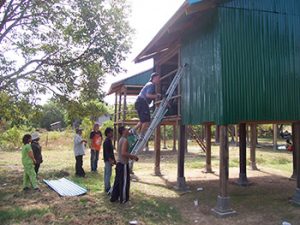 Richter also serves on the Board of Directors of the Hamomi Children’s Centre in Kenya, an organization that provides comprehensive care for orphaned and vulnerable children living in the slums of Nairobi. Through their primary school and scholarship program, they provide education for those children who would otherwise not have access to it. By providing food, medical care and job opportunities, they take into account outside influences which interfere with impoverished students’ education. This means their students receive immediate benefits from attending school, are better able to concentrate in class, have stronger immune systems and as a result score higher on tests. Although the organization is still young, it is already proving invaluable to the more than 140 children it serves.
Richter also serves on the Board of Directors of the Hamomi Children’s Centre in Kenya, an organization that provides comprehensive care for orphaned and vulnerable children living in the slums of Nairobi. Through their primary school and scholarship program, they provide education for those children who would otherwise not have access to it. By providing food, medical care and job opportunities, they take into account outside influences which interfere with impoverished students’ education. This means their students receive immediate benefits from attending school, are better able to concentrate in class, have stronger immune systems and as a result score higher on tests. Although the organization is still young, it is already proving invaluable to the more than 140 children it serves.
Of his work with Tabitha and Hamomi, Richter lists three goals; they move from specific to general, and this progression is perhaps a microcosm for his professional life so far. First, he wanted to build houses. Second, he wanted those living in other countries to meet “normal Americans and judge us for who we are,” and third, he wanted young Americans to have the opportunity to travel abroad and see, as he did as a child, that there exists a big, wide world outside their doorstep. “The ripple in their pond,” he says, will create many more ripples in the future, and the more chances young people have to travel and encounter new perspectives, the more we value our connections to each other.
Back to Top
Welcome New Members
Please welcome our newest Global Washington members. Take a moment to familiarize yourself with their work and consider opportunities for support and collaboration!
Marine Stewardship Council
Our mission is to use our ecolabel and fishery certification programme to contribute to the health of the world’s oceans by recognising and rewarding sustainable fishing practices, influencing the choices people make when buying seafood, and working with our partners to transform the seafood market to a sustainable basis. http://www.msc.org
University of Washington Bothell
Holds the student-faculty relationship to be paramount. We provide access to excellence in higher education through innovative and creative curricula, interdisciplinary teaching and research, and a dynamic community of multicultural learning. www.uwb.edu
Sou Digna / I Am Worthy
Mission: Sou Digna expands the rights of impoverished women and girls living in Salvador, Brazil, through job training, community development, and education. www.soudigna.org
Save the Children
Save the Children is the world’s leading independent organization for children. Our vision is a world in which every child attains the right to survival, protection, development and participation. Our mission is to inspire breakthroughs in the way the world treats children and to achieve immediate and lasting change in their lives www.savethechildren.org
World Justice Project
The World Justice Project, an independent, non-profit organization, develops communities of opportunity and equity by advancing the rule of law worldwide. http://worldjusticeproject.org/
Massai Children’s Initiative
The Maasai Children’s Initiative (MCI) advocates for social empowerment and economic development for Maasai girls through education, leadership development and technology training. While we support the education of all Maasai children, our vision is that Maasai girls become empowered to determine their own futures, make wise life decisions and positively impact their communities. http://maasaichildrensinitiative.org/
Global Weeks: Vicki Weeks, Independent Consultant in Global Experiential Education.
Back to Top
Career Center
Highlighted Paid Positions:
Development and Communications Coordinator – iLEAP
iLEAP seeks a creative, mission-driven individual to serve as its new full-time Development and Communications Coordinator. This person will work closely with iLEAP’s leadership team to expand iLEAP’s community of donors and partners and to strengthen the overall fundraising program. In addition, this person will play a key role in implementing iLEAP’s communication strategy to reach diverse audiences and build awareness of iLEAP’s mission and impact. More.
Vice President of Programs – World Affairs Council
The Vice President of Programs is a full-time position and plays a key leadership role within the World Affairs Council and our community as it relates to international affairs. This position oversees all program development and implementation for the World Affairs Council. It leads program staff across the three main programs of the Council — Community Programs, International Visitor Program, and Global Classroom — to develop events and implement an integrated program strategy that achieves the Council’s vision of a greater Seattle community that is connected, engaged, and inspired to create change in the world. More.
Community Health Promoter (Global to Local Initiative) – University of Washington Global Health Resource Center (GHRC)
The Community Health Promoter (CHP) will play a key role in educating community members on health promotion and disease prevention activities. This will be accomplished in part by conducting community outreach and working closely with community shareholders to identify and address community health barriers and priorities through the development of Community Action Plans. More.
Highlighted Internship Opportunities:
Marketing Internship – Prosthetics Outreach Foundation
POF is seeking Marketing Interns for the Fall 2012, Winter 2013 and Spring 2013 Quarters! Interns will assist in creating web pages that effectively promote and publicize POF’s services, activities, events, and fundraising; write press releases and public service announcements; and Generate articles for the website, promote articles via social media, and assist with the newsletter.More.
Highlighted Volunteer Opportunities:
International Environmental Organizations Volunteer – EarthCorps
The international corpsmember position is a 6-month service learning experience with EarthCorps in Seattle, WA, USA. Young environmental leaders from countries outside the United States will join US AmeriCorps members to develop skills in environmental service, community building and leadership. This is not a classroom or workshop. Corpsmembers spend 80% of their time in the field engaged in environmental restoration projects throughout the Puget Sound region of Washington State. Restoration is very physically demanding and takes place outdoors in all weather conditions.
Participants take part in environmental restoration projects, such as tree-planting, trail construction, stream restoration, and invasive plant removal. Projects are located throughout Washington State. More.
International Corpsmember Volunteer (June – December 2013) – EarthCorps
The international corpsmember position is a 6-month service learning experience with EarthCorps in Seattle, WA, USA. Young environmental leaders from countries outside the United States will join US AmeriCorps members to develop skills in environmental service, community building and leadership. International corpsmembers are sponsored by EarthCorps on a J-1 Trainee visa. This is not a classroom or workshop. Corpsmembers spend 80% of their time in the field engaged in environmental restoration projects throughout the Puget Sound region of Washington State. Restoration is physically demanding and takes place outdoors in all weather conditions. More.
For more jobs and resources, visit www.globalwa.org/resources/careers-in-development/
Back to Top
Announcements
HUB Seattle grand opening
HUB Seattle is celebrating its grand opening this Friday, October 26th from 6pm to midnight! This is a great chance to see the new space and enjoy appetizers, live music, speakers, and more. HUB Seattle describes itself as “a coworking and events space for inspiring people. With a focus on supporting entrepreneurs bent on changing the world for good, the Hub is both network and nexus—equal parts office, clubhouse, and café combined in a comfortable community for making connections while progressing toward individual goals. Join us and enjoy blazing connectivity, inspiring meeting/work spaces, and a full-time hosting staff on hand to help you find the resources, partners, investors, and education that your venture needs.”
Schools for Salone 2nd annual Seattle anniversary dinner
Schools for Salone is gearing up for its second annual anniversary dinner on November 17th. Doors open at 5:30 at the Hall at Fauntleroy in West Seattle. Your $100 ticket includes dinner and complementary wine from IdleCellars.com and Chateau Ste Michelle. Margaret Larson of KING 5 TV will be the Emcee again this year and Black Nature of the Sierra Leone’s Refugee All Stars will be sharing his story and beautiful music. Tickets are available at SchoolsforSalone.org. The organization is also excited to announce a $10,000 matching grant from the Shultz Family Foundation
Schools for Salone was started by Sierra Leone RPCV’s who make up the majority of the board and efforts on this side of the Atlantic. Their partners on the ground in Sierra Leone, who make the work possible, are long time friends and colleagues from the Peace Corps days. The organization continues to be connected with and work with Seattle area schools and groups to help them learn about Peace Corps and life in Sierra Leone. Schools for Salone work hard to live up to the third goal of Peace Corps. Find out more at SchoolsforSalone.org.
Washington State: Collaborating to end poverty
Global Washington’s guest blog on Interaction’s website highlights Washington’s collaborative global development community as a special innovation in the global fight against poverty. We are thrilled to be putting the state of Washington on the map a premier hub for effective global development work!
The World Affairs Council presents “Global Warming Gridlock”
On October 25, 2012, The World Affairs Council presents a conversation with David Victor, professor at the School of International Relations and Pacific Studies at the University of California, San Diego and director of the School’s new Laboratory on International Law and Regulation. Victor will discuss how to make international law on global warming more effective by encouraging bottom-up initiatives at national, regional and global levels, leveraging national self-interest rather than wishful thinking.
Global Warming Gridlock will take place from 5:30 to 7:20pm at Washington Hall (153 14th Ave, Seattle, WA 98122) and the price is $10 for students and members and $15 for non-members.
Nominate your hero for our “Global Hero Award”
Global Washington’s 4th Annual Conference will feature a special presentation of The Global Hero Award. This award honors an outstanding leader from the state of Washington who has contributed significantly to global issues and made a great impact in the world. Learn more or nominate your hero.
Foreign policy debate questions
Global Washington joined numerous national global development organizations in endorsing the following debate questions for our presidential candidates:
Previous presidents on both sides of the aisle have supported assistance programs to help stabilize countries, open markets and show compassion for those in need. Many people don’t realize that less than one percent of the federal budget goes to foreign assistance, which covers anything from life-saving vaccinations to girls’ education.
Governor, you’ve said before that the United States must exercise greater “soft power.” You described foreign assistance as humanitarian, in our strategic interests, and important for encouraging economic opportunity. How important will this kind of “soft power” be in a Romney administration?
Your predecessor, President George W. Bush, championed programs to tackle AIDS and malaria, resulting in huge gains in both areas. If you are reelected, what will be the lasting legacy of the Obama administration to help those in extreme poverty around the world?
MFAN releases open letter to USAID Administrator
The Modernizing Foreign Assistance Network has released an open letter to USAID Administrator Rajiv Shah, demonstrating support for USAID’s Implementation and Procurement Reform Initiative, which is designed to strengthen local capacity in our partner countries and increase the sustainability of development by raising the amount of development assistance administered through country governments and local organizations and businesses. Dozens of premier global development organizations and leaders have endorsed the letter, including Global Washington and many of its members.
Please take a moment to read the letter MFAN’s accompanying statement and share with your networks.
Support Bahia Street Brasil through Party for a Passion
Join Sou Digna and Bahia Street Brasil on Saturday ,November 17 from 7 to 10pm at the Rainier Valley Cultural Center (3515 South Alaska Street, Seattle) at Party for a Passion! Bahia Street Brasil provides pathways from poverty to opportunity for girls and young women in Salvador da Bahia, Brazil. 100% of funds raised at this event will be directed to Bahia Street Brasil. The party will feature music by Eduardo Mendonça of Show Brazil, homemade Brazilian desserts, drinks, and Guarana donated by Kitanda. There is a $15 suggested donation at the door. Bahia Street Brasil’s is supported by Sou Digna/ I Am Worthy. Donations can be made outside of the event through Sou Digna’s website.
Pacific Northwest Africa Donors Forum
As part of its mission to strengthen American giving to Africa, the African Women’s Development Fund USA (AWDF USA) and its Pacific Northwest Organizing Committee are pleased to announce the first-ever Pacific Northwest Africa Donors Forum. The forum will take place on Thursday October 25, 2012 from 4:00 PM to 8:00 PM at the West 8th Building (2001 8th Avenue, 4th Floor Conference Room, Seattle). Cost is $40.
On display now at SAM: Art by Burmese refugees
On display at the Seattle Art Museum until November 4th, Forced to Flee: Visual Stories by Refugee Youth from Burma is a special art exhibition by Refugee Youth Empowered. Burmese refugees are the fastest growing refugee community in the country. These paintings tell the story of refugee youth from Burma who were forced to flee their home country.
Jet City Stoveworks seeking partners
Seattle based Jet City StoveWorks (JCS) has a new kind of cook stove. This Jiko Safi (clean burning stove in Swahili) is fueled by the oil rich seeds of the Jatropha curcas, a common tropical hedge row shrub. To learn more about the cook stove and what it could mean to village women and children, please read this introduction at http://www.jetcitystoveworks.com/announcement-for-jiko-safi.
JCS will fund one or two start-up programs to introduce the Jiko Safi. We are inviting organizations that work in agriculture, women’s economic development, village finance and related areas to apply. If your organization or one that you work with is interested, the application and the instructions are at http://www.jetcitystoveworks.com/initiative-2013. The completed application is due on January 31, 2013.
For additional information, contact David Otto at 206 325-6765 or jetcitystoveworks@gmail.com
Seattle Chapter, Society for International Development (SID) Monthly Meeting
The next meeting is on November 12 and will feature Caroline Clark, from the Inter-American Development Bank.
For Whom: Anyone with a background or interest in International Development
Where: 221 Yale Avenue North, Suite 450 (SightLife offices, across from REI)
When: Second Monday of each month, 6:30 – 8:30 PM
Cost: First meeting is free; membership is $45
Growing Health Soils workshops
Global Washington member organization SeaChar is partnering with several other organizations for special 2-day workshops offered in both the fall and the spring. Growing Health Soils and Communities with Biochar will take place on November 17th and 18th or April 27th and 28th at Sammamish Valley Farm. Participants will learn about biochar, engage in harvesting biomass, and participate in hands on activites that help incorporate the biochar product into the soil at the farm.
PeaceTrees Vietnam announces new Executive Director
PeaceTrees Vietnam has recently hired Michael G. Auch as its new Executive Director. Auch has extensive NGO leadership experience and has previously worked with organizations like Communities in Schools and the Center for Independence. He has served as the PeaceTrees interim director since April and his position became permanent on October 1st. Congratulations to Michael G. Auch and PeaceTrees!
InterConnection announces new drop-of location in Tukwila
InterConnection is a computer reuse and recycling center that works to make information technology available to underserved communities around the world. InterConnection is partnering with Batteries Plus in Tukwila to begin accepting donations at a new location: 17065 Southcenter Parkway, Tukwila, WA 98188. Don’t forget to donate your old computers, cell phones, and monitors so that they can be put to good use!
Startup Red Lotus Technologies uses smartphones to detect landmines.
Landmines kill thousands of people each year, over half of whom are children. Over one hundred million landmines scatter the globe, and it is estimated that it will take over 100 years to clear these landmines at the current rate of removal.
A Seattle-based start-up, Red Lotus Technologies, has a new solution to this problem that uses a widely-available and affordable technology: a smartphone. By using smartphones to aid in the detection of landmines, the company’s research has shown that they will increase the speed of landmine removal and increase deminer safety.
Red Lotus Technologies is currently running a fundraising campaign to get its product to Cambodia – to support this project or spread the word, click here.
Exhibit at the NCSS Annual Conference
National Council for the Social Studies Annual Confernce will take place on November 16-18 and exhibit space is available! Exhibiting at the 2012 NCSS Annual Conference will put you in touch with thousands of classroom teachers, leaders, and other decision makers in social studies education. They will come to learn, gather ideas, and shop. Many will cite the exhibit hall among the conference highlights—creating a prime opportunity for exhibitors to make strong impressions. The first NCSS conference in the Pacific Northwest in 45 years will draw educators from both sides of the border, including many attending their first conference, providing exhibiting organizations an important opportunity to develop lasting, personal relationships with potential new customers. http://www.socialstudies.org/conference/exhibitors
Back to Top
Global Washington Events
Thursday, November 1
Strength in What Remains: Deo Niyizonkiza and Village Health Works
Tuesday, November 13
Lama Tenzin: Buddhist Monk and Children’s Advocate
December 6, 2012
GlobalWA Conference 2012
Back to Top
Other Events
Wednesday, October 24
Immigration Policy and Presidential Politics, Professor Amy Kinsel, History Department, Shoreline Community College
Getting to the Heart of Global Development: Personal Dialogues with Grass-Roots Change Leaders from Around the World
US Trade Policy and the Presidential Election, Eric Schinfeld, President, Washington Council on International Trade
Thursday, October 25
Pacific Northwest Africa Donors Forum
Global Warming Gridlock
Saturday, October 27
14th Annual Africa Day Business Forum
Sunday, October 28
SAVE THE DATE: Smiles Forever 12th Annual Live-Auction Fundraiser
Wednesday, October 31
US Defense Policy and the Presidential Election, Speaker to be announced
Thursday, November 1
Obama vs. Romney: Who will be the better foreign-policy President? A debate led by members of the SCC WPDSS Student Club
Wednesday, November 7
WFA Film Series: The Invisible War
Saturday, November 10 – Monday, November 19
PartnerTrips
Monday, November 12
Seattle Chapter, Society for International Development (SID) Monthly Meeting
WFA Film Series: The Invisible War
Tuesday, November 13
Program Evaluations 201: Using evaluation data to set direction, expand impact and maintain accountability
Grandmother Power: A Global Phenomenon
Thursday, November 15
WFA Film Series: The Invisible War
Saturday, November 17
Schools For Salone 2nd Anniversary Dinner
Party for a Passion… In Support of Bahia Street Brasil
Saturday, November 17-18
BioChar Workshops
Sunday, December 2
Living Earth Institute Fundraiser: “Toilets Today for Health”
December 6, 2012
GlobalWA Conference 2012
Tuesday, December 11
Volunteer Management 201: Essential ingredients and successful recipes for volunteer engagement
Contributors: Megan Boucher, Carolyn Hubbard
Editor: Megan Boucher
Back to Top
Global Education Initiative
Posted on October 11, 2012.
- Read an executive summary of the report and recommendations.
- Read the full report on the State of global education in Washington State.
- Framing Articles: background materials.
- Global Education Resources: One of the recommendations coming from the Initiative is a common online resource hub for global education. The K-20 Global Education Initiative has been gathering favorite resources from individuals working in global education. This is a draft and we need your feedback to grow this list. Please review when you have the chance and send an email to info@globalwa.org if you have any suggested resources or comments about current resources. Thank you for contributing!
- Video: “Global Education Is”: a short video helping us define what “global education” means.
Other Resources
Interview with Global Washington: Convening the Sector for Collective Action
Posted on September 26, 2012.
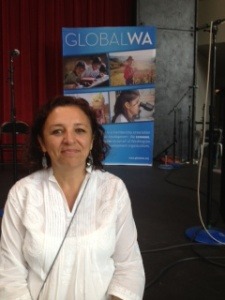 My next interview was with Global Washington, an umbrella organization for Seattle’s international development NGOs. Bookda Gheisar, Global Washington’s Executive Director states, “We started Global Washington four years ago because there were many small nonprofits based out of Seattle who were working in the developing world, and we knew that if we could get them talking there would be greater collaboration, better partnerships and an elimination of redundancy.” Amanda Bidwell from Global Washington reiterated this point, arguing that “we believe that lasting change comes from collective impact. Our partners know that the problems we are each working on are interconnected and that we are more effective when working together.” I personally find this ecosystem argument compelling. I remember Dr. Paul Light, one of my professors at NYU-Wagner and a scholar of social entrepreneurship, arguing that it was often the swarm of NGOs working on different pieces of a common problem, rather than a single NGO going it alone, that led to deep and enduring change. If Global Washington can help building the collective capacity of Seattle’s international development community to change the world then I’m all for it.
My next interview was with Global Washington, an umbrella organization for Seattle’s international development NGOs. Bookda Gheisar, Global Washington’s Executive Director states, “We started Global Washington four years ago because there were many small nonprofits based out of Seattle who were working in the developing world, and we knew that if we could get them talking there would be greater collaboration, better partnerships and an elimination of redundancy.” Amanda Bidwell from Global Washington reiterated this point, arguing that “we believe that lasting change comes from collective impact. Our partners know that the problems we are each working on are interconnected and that we are more effective when working together.” I personally find this ecosystem argument compelling. I remember Dr. Paul Light, one of my professors at NYU-Wagner and a scholar of social entrepreneurship, arguing that it was often the swarm of NGOs working on different pieces of a common problem, rather than a single NGO going it alone, that led to deep and enduring change. If Global Washington can help building the collective capacity of Seattle’s international development community to change the world then I’m all for it.
Interview with Global Washington: Convening the Sector for Collective Action
Lasting Change | Ryan Richards | September 22, 2012
September 2012 Newsletter
Posted on September 19, 2012.
Welcome to the September 2012 issue of the Global Washington newsletter. If you would like to contact us directly, please email us.
IN THIS ISSUE
Note from our Executive Director
 Greetings,
Greetings,
It seems to be the month of the girl! Whether you have daughters who are heading back to school as I do, or you are simply interested in issues affecting girls worldwide—we are offering many ways to support work that benefits girls, engage with the relevant issues, and encourage your children to learn and engage as well.
We are so excited for our event, GlobalFest: Stand for Girls, coming up this Saturday! I really hope to see you all there—this free event will take place at the Seattle Center and we invite the whole community to come and learn about what our member organizations are doing to benefit women and girls around the world. Some highlights: world music by SuperSones and MBOrchestra, GlobalEDU lectures about topics relating to women, inspiring speakers, coupons for free bagels for the first 500 to show up, and the opportunity to meet 40 of our member organizations through interactive booths!
This month, much of our work surrounding this event has been to really highlight the issues affecting women and girls and the organizations that are working on addressing them. The Stand for Girls Campaign is an innovative venture that we launched in partnership with 10 of our member organizations. We are so proud to say that even during a time when many organizations are jealously guarding their funding, these 10 are instead working together to raise money and awareness, recognizing that collectively they can do much more than anyone can do alone! I highly recommend their work and hope that you will consider supporting them by giving our suggested $12 donation (or more!) and then encouraging 12 of your friends to do the same. Together we are more powerful, and we need to work together to make a difference!
Global Washington could also use your support this week! We have been nominated for Chase Community Giving Grant but we need your vote. Please login to Facebook, go to https://apps.facebook.com/chasecommunitygiving/, and search for Global Washington to support us in this way.
Thank you for your support and I hope to see you this Saturday!
In unity,

Bookda Gheisar, Executive Director
Back to Top
Support Global Washington!
Global Washington has been nominated for a Chase Community Giving Grant! We need YOUR vote to get funded from Chase Community Giving. If you haven’t yet, please VOTE and SHARE with your friends. Voting ends TODAY. Follow the link and search for Global Washington to cast your vote. Thank you for your support—we could not do this without you!
Vote now: https://apps.facebook.com/chasecommunitygiving/ You will need to log into Facebook and accept the application in order to vote.
Back to Top
The Mona Foundation
“What is your plan?” Supporting and Learning with Local Educational Initiatives
By Megan Boucher
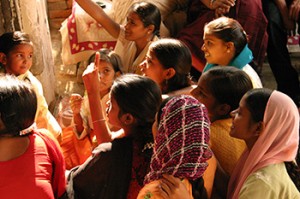
Class at Digital Study Hall, India
Antari was a shy girl who could not even pronounce her own name properly. She dropped out of school three times before she finally enrolled at the Barli Institute for the Development of Rural Women, an educational program for girls that is based in India and supported by the Mona Foundation. After attending the Barli Institute, Antari came back to her village with renewed confidence and skills. She started a tailor shop and went on to receive her Masters of Philosophy in Education. She is now a post-graduate in Hindi literature and works as a teacher in Dahi Village.
The Mona Foundation focuses on two central issues: universal education and raising the status of women and girls. To accomplish this mission, the organization supports grassroots, locally-based programs like the Barli Institute, which has educated over 6,000 women from 500 villages. The Barli Institute provides educational opportunities to rural women, most of whom start the program with little or no reading and writing skills. Within six months, the girls learn to read and write, pass their national exams, and learn a vocation like tailoring. The basis of the project is gender equity. Most graduates return to their villages with the confidence to serve in their local communities. They may teach others to read, teach about healthcare and safe drinking water, or get involved with local governments.
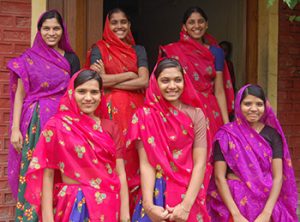
Students from Barli Institute, India
The Mona Foundation was started in 1999 when a small group of friends attended a social economic development conference and become intrigued by the issues presented. During lunch, they met in a little café to brainstorm and doodle ideas for how to address some of the issues presented. “Mona was the result of those doodles on napkins so long ago,” recounts Gaellen Quinn, Mona’s current Executive Director. “I found it inspiring because it would have been so easy for Mona’s founders to say ‘these are great ideas’ and then just go back to their busy lives. But they didn’t.”
The Mona Foundation was formed to support education and empower girls using a model that is highly collaborative and seeks to listen and learn from local communities. Supported programs are all locally operated with a proven record of sustained success. Mona comes alongside them with an attitude of support, providing funding and resources to make the initiatives succeed without imposing an outside agenda.
Quinn described a project in Panama as an example of this model. The Ngobe-Bugle tribes live in the mountains of Panama, isolated from services and the rest of Panamanian society. Their main work is farming and most who live there are extremely poor. However, many among them have a deep value for education. A group of men made a solemn pact with each other, saying “we cannot let our children go on another generation without education.” These men were more educated than many in the community so they started leaving their own farms for periods of time and travelling to remote villages to teach the children there.
The Mona Foundation come alongside the Ngobe-Bugle at this point in their development, and began by providing a stipend to these teachers to make up for the lost income while they were away from their farms. Mona then helped them get teaching credentials so they could be paid as teachers by the government. Finally, Mona provided support as these informal tutorial sessions were consolidated into actual schools.
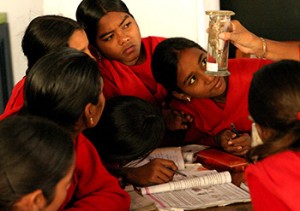
Class at Digital Study Hall, India
Later the Ngobe-Bugle came back to the Mona Foundation saying that they wanted a university. The Foundation was surprised by the ambitious request, but instead of saying no or trying to control the project, they asked the question they always ask their partners: “what is your plan?” The Ngobe-Bugle responded a year later with a detailed plan for the university that they wanted to create. The curriculum would be based in math and science so that their youth would gain the skills needed to conceive and execute economic development projects in their homeland. The Foundation agreed to the project and gained help from Microsoft to build two solar-powered community technology and learning centers so that this remote university could connect with the University of Panama Library remotely.
“The sweetest thing was when they first came back to the Mona Foundation with this big plan for the University,” Quinn recounted of the process of working with the Ngobe-Bugle. “These very humble, very dignified people looked at our board president and said gently and with conviction ‘and this we will do, with or without you.’” Quinn was also impressed when the Ngobe-Bugle later came back to the Foundation and said that things in their villages were changing with education, new roads, and services that had not been available before. They wanted time to reflect on the changing conditions and asked Mona not to give them any more money until they could decide what should come next.
The Mona Foundation’s interactions with the Ngobe-Bugle illustrate how a project is supposed to work—self-directed by the local communities, with Mona coming alongside with an attitude of learning to support existing programs and local visions for the community. “We learn a lot from these folks,” said Quinn. “It’s easy to come in and say how they should do things—but we really don’t know. We could have told them to sell their beautiful embroidery, but that’s not what they wanted. They wanted a university.” And now they have one. Ngabe Bukle Universidad opened its doors in 2007 and is the first-ever indigenous university on native lands in Panama.
Learning is one of the Mona Foundation’s core principles, not only in the programs it supports but also in the organizational ethos. “The world has never achieved a state where poverty and war have been abolished,” explained Quinn. “We don’t know how to do it. Nobody knows how to do it—if we knew how, I think we would do it! But we are all learning and we are all learning together.” Mona seeks to look past what Quinn called the “false dichotomies” between global north and global south, developed nations and underdeveloped nations, and so forth. Such divisions create barriers and inhibit learning.
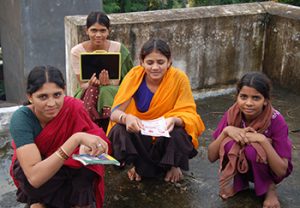
Women at Barli Institute, India
Instead, the Mona Foundation recognizes that we are all developing and we all have much to learn from each other. “This is one of the reasons we really love what you [Global Washington] do and are so happy to come and share,” said Quinn. “Because we know that we don’t know it all!”
The Mona Foundation has achieved much over the years through this attitude of listening and learning. They started with 3 small projects that served 450 children and have grown to support 15 projects in 9 countries that serve over 40,000 children and their families. They also support U.S. programs, especially with minorities or migrant children. One project called Teaching Kids Programming is especially aimed to narrow the technology gap for girls. Teaching Kids Programming will soon start a new project in Hawaii on the Island of Molokai.
Many of the projects that Mona supports have won awards, for instance the Digital Study Hall recently received a Peter F. Drucker award for nonprofit innovation. The Foundation’s Board President, Mahnaz A. Javid, has been nominated for the second time as a finalist for the Microsoft Alumni Foundation Integral Fellows Award Program. But Quinn feels that the organization’s greatest accomplishment is the dedication and collaborative spirit of the organization’s leadership, who epitomize the Mona Foundation attitude of respectful learning. “That’s not something that everyone gets to see so you can’t get an award for it!” laughed Quinn. “But from the inside out it’s great.”
The Mona Foundation’s simple question: “What is your plan?” has sparked excitement, innovation, and vision that is transforming both communities abroad and the Mona Foundation itself. These projects are shining examples of how learning and collaboration can make a real difference for children and communities around the world.
Back to Top
Changemaker
Water 1st Partner, COCEPRADIL, and Board President Wilfredo Ramos Ventura Keep the Water Flowing
By Carolyn Hubbard
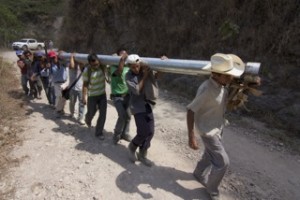 Across rugged terrain in the mountainous region of Lempira, Honduras, men and women carry heavy pipes uphill to a water source, dig trenches for miles, and link and secure each section, forming a long silvery snake through which clean water will flow to kitchens in their homes. Elsewhere, another group replants the heavily deforested land to protect their watershed and this most vital and treasured of resources: water.
Across rugged terrain in the mountainous region of Lempira, Honduras, men and women carry heavy pipes uphill to a water source, dig trenches for miles, and link and secure each section, forming a long silvery snake through which clean water will flow to kitchens in their homes. Elsewhere, another group replants the heavily deforested land to protect their watershed and this most vital and treasured of resources: water.
Honduras is considered the second poorest country in Central America. Unequal wealth distribution and high unemployment, caused from systemic government corruption and economic mismanagement, beset the country of eight million. Lempira Department is one of the most cut-off areas in the country. Bordering El Salvador, it’s mountainous, land-locked, and far away from the urban hub of Tegucigalpa or the touristy coast. Instead some 270,000 people eke out a living from the land. Deforestation is a problem, as is access to clean water.
COCEPRADIL, an acronym for Central Committee for Water and Comprehensive Development Projects in Lempira, has been working for some twenty years to help communities gain access to clean water and sanitation. The Seattle-based organization Water 1st, which offers financial support to community-based organizations focused on the collective development and maintenance of water and sanitation systems within their communities, has partnered with COCEPRADIL. This partnership enables the Honduran organization to continue, even prosper, during some difficult economic times. Wilfredo Ramos Ventura, who will visit Seattle in November to participate in Water 1st’s fundraising event, the Give Water Give Life Benefit, is the board president of the exclusively volunteer-run organization.
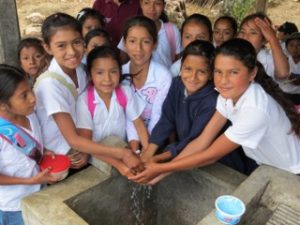 Communities that would like COCEPRADIL to help them gain access to clean water must provide the time and labor. (One recent project serving 300 people took 20,000 hours of hard work.) Two adults from each household in the community must also commit to five weeks of full time training on sanitation and water management. Once the community agrees to these conditions, COCEPRADIL will approve the work. The community then becomes part of COCEPRADIL and participates in community meetings, serves on the board and pays a small water-access bill, the proceeds of which are used to train community members.
Communities that would like COCEPRADIL to help them gain access to clean water must provide the time and labor. (One recent project serving 300 people took 20,000 hours of hard work.) Two adults from each household in the community must also commit to five weeks of full time training on sanitation and water management. Once the community agrees to these conditions, COCEPRADIL will approve the work. The community then becomes part of COCEPRADIL and participates in community meetings, serves on the board and pays a small water-access bill, the proceeds of which are used to train community members.
“Our families are interested in how they are made owners of the source and the micro-watershed to ensure the reforestation and forest conservation in these areas,” Ramos notes. “Families know they have to be in the training workshops after working hours. They understand that this year, they’ll spend more hours a day and more days a week at their jobs, because in addition to the normal work of growing their corn, their beans, their rice, they have to work on the project, two or three days, and besides that, enroll in a training program together and make those changes in attitude.” They know the demands that are going to be placed on them, and, Ramos notes, they love it. The workshops motivate them and the work provides families and communities a sense of cohesion and organization, which in turn provides them the foundation from which to advocate for themselves. “They have organized and gone to the mayor to ask about providing a school, or to say they need a health center, or to show support for the teacher or nurse. They understand clearly that to achieve, you have to be together and speak, as we say here, the same language.”
Born and raised in Lempira, Ramos knows first hand the harsh life that many in the area endure. “I was born into a poor family. My first eight years I walked barefoot. I didn’t have three meals a day. It satisfies me greatly now that my daughters have new opportunities. Growing up, I longed to be able to go to school for longer, but our family situation wouldn’t allow it. What I couldn’t achieve for myself then, I now want others to achieve. We are glad to see a child can laugh because of the improved living standard, that they have access to at least three meals a day, which is a human right. That makes us happy.”
Ramos points out that women benefit greatly from a community’s improved access to water. He recognizes that by not spending the day seeking water, they have more time to be actively involved in community development and are also more respected by their husbands. “The levels of domestic violence are reduced too, thanks to the organizing work we do and how men are becoming more understanding of their wives.”
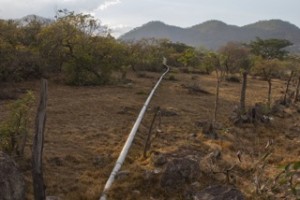 Ramos has only one more year to serve as president, but he’s not going to stop working with COCEPRADIL. He is committed to continuing the work, regardless of the hardship. “We are in this fight to continue improving. Our goal is to satisfy the needs in the Zona Sur South Zone, then the department of Lempira, to have water and sanitation in each house. We are achieving this little by little, but there is still a lot that needs to be done. Unfortunately, the systems are expensive now. Water sources are miles away from the communities, and that prevents us from being able to do things in less time.”
Ramos has only one more year to serve as president, but he’s not going to stop working with COCEPRADIL. He is committed to continuing the work, regardless of the hardship. “We are in this fight to continue improving. Our goal is to satisfy the needs in the Zona Sur South Zone, then the department of Lempira, to have water and sanitation in each house. We are achieving this little by little, but there is still a lot that needs to be done. Unfortunately, the systems are expensive now. Water sources are miles away from the communities, and that prevents us from being able to do things in less time.”
Funding from Water 1st and its private donors has allowed COCEPRADIL to complete projects and help more communities. Speaking on behalf of COCEPRADIL, Ramos notes, “Even though we don’t know these families, who are in our hearts, we are reallly very grateful for the donations that for us, as poor farming families with few economic resources, are invaluable. Without such help, our situation would be very different.”
You can learn more about COCEPRADIL’s work at Water 1st. Check back there for more information on November’s fundraiser and a chance to meet Wilfredo Ramos Ventura. Also check out the Changemaker article about Water 1st’s inspiring executive director in our August 2009 newsletter.
Back to Top
Welcome New Members
Please welcome our newest Global Washington members. Take a moment to familiarize yourself with their work and consider opportunities for support and collaboration!
Educational Empowerment
Educational Empowerment (EE) is dedicated to providing access to an educational environment in Southeast Asia that improves children’s future economic opportunities and affords them fundamental reading skills. http://www.educationalempowerment.org
Lift Up Africa
Lift Up Africa is a US nonprofit with an extensive network of partners and projects in East Africa. We support sustainable, community led projects that address poverty, malnutrition, lack of education and health care, and the impact of climate change on people, crops, animals and the environment. http://liftupafrica.org/
Back to Top
Career Center
Highlighted career
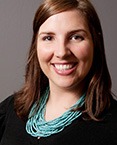 Name and Profile: Abby Stepaniak. Program Officer, International Visitor Program, World Affairs Council
Name and Profile: Abby Stepaniak. Program Officer, International Visitor Program, World Affairs Council
I work with the Department of State’s International Visitor Leadership Program which brings leaders from around the world to the States for professional development and exchange. I work to connect these leaders with their counterparts here in Seattle to foster collaboration, cross-cultural exchange, and open dialogue about the world. More.
Highlighted positions
Northwest Regional Manager, Special Events – Friends of the Orphans
The Director of IVP oversees all program operations and leads a staff of three to successfully execute high-quality, high impact programming for visitors from all corners of the world in a wide array of fields. More.
Northwest Regional Manager, Special Events – Friends of the Orphans
The Regional Manager, Special Events is a full-time exempt employee of Friends of the Orphans and reports to the Regional Director. The Manager will plan and execute successful fundraising events that benefit the work of Friends of the Orphans, including (but not limited to) cultivation events, house parties, gala auctions, one-hour ask events, and events with schools, businesses, and faith communities. The Manager participates fully in activities of the national organization and regional chapter to reach annual revenue goals and the overall strategic goals for the entire organization. More.
Senior Foundation and Corporate Development Specialist – Landesa
The Senior Foundation and Corporate Development Specialist (Senior Specialist) is responsible for performing the full array of activities related to securing revenue from private foundations and corporations. The Senior Specialist will also be asked to perform other appropriate tasks to support the Landesa revenue-seeking and program delivery function. More.
Research Assistant – Landesa
The Research Assistant conducts and documents research and supports the research efforts of others on a variety of topics relevant to Landesa’s work. More.
Highlighted Internships
US GCC Monitoring and Evaluation Internship- Mercy Corps (Portland)
Implement and extend strategy for the upcoming school year to monitor and evaluate education programming at the PDX Action Center and GCC US program. Research and update tools that educators use to monitor programs. Interview relevant staff to understand the needs of the monitoring program. More.
Intern/Volunteer Research Position–Mangrove Action Project
Mangrove Action Project is seeking volunteer or intern help for a project we are planning to conduct as part of our ongoing Question Your Shrimp Campaign. We want to assess the number of restaurants in Seattle that are serving shrimp, or have shrimp on their menus. More.
Highlighted Volunteering Opportunity:
Volunteer – One by One
We currently have volunteer needs in the following areas:
• Office: stuff envelopes (normally we work with Seattle area people who can physically come in a help us)
• Interns with project-specific research, data entry, curriculum development projects
• Website/translating volunteers
• Short/long term projects
• Technical expertise—excited to work with people all over the country, long term (researchers, graphic designers, photographers, film makers, translators). More.
Technology Committee Volunteer- Literacy Bridge
For people who are professional software developers, testers, support staff, and technical writers.
Activities will include:
1) developing, debugging, testing, and documenting the Talking Book’s software
2) providing email technical to support Literacy Bridge’s partners. More.
For more jobs and resources, visit www.globalwa.org/resources/careers-in-development/
Back to Top
Announcements
Why should you attend GlobalFEST on September 22nd?
You’ll meet over 40 organizations that are actively changing the lives of women and girls all over the world. You’ll listen to MBOrchestra’s Middle Eastern music and the Cuban melodies of the SuperSones. And you’ll be invited to a special screening of Half the Sky as well as a series of GlobalEDU lectures on Global Studies, Raising a Global Child, and Secrets to the Development Field’s Job Market. We hope to see as many of you as possible.
Learn more here: http://standforgirls2012.org/
When: Saturday, September 22nd, 2012 11:00am – 4:00pm
Cost: No Charge
Where: The Center House @ Seattle Center
MAP
The Growing Movement of Half the Sky
Filmed in six countries, Half the Sky: Turning Oppression into Opportunity for Women Worldwide follows Nicholas Kristof, Sheryl WuDunn, and celebrity activists America Ferrera, Diane Lane, Eva Mendes, Meg Ryan, Gabrielle Union, and Olivia Wilde on a journey to tell the stories of inspiring, courageous individuals. Half the Sky: Turning Oppression into Opportunity for Women Worldwide is a special presentation of Independent Lens broadcasting on PBS October 1st and 2nd, 2012.
http://www.pbs.org/independentlens/half-the-sky
This month there will be numerous screenings around Washington, including one at Global Washington’s GlobalFest event on September 22nd. Make sure not to miss this film!
Seattle
Saturday, September 22
The Center House at the Seattle Center
12:00pm
A part of Global Washington’s GlobalFest: Stand for Girls Event
Vashon
Tuesday, September 25
Vashon Theatre thanks to GreenTech
6-8 PM, doors at 5:30 PM
Bellingham
Tuesday, September 25
Pickford Film Center
5:30-7:30 PM, doors at 5:00 PM
Clarke Nuber P.S. presents Not-for-Profit Audit and Tax Update: Federal Taxes and Financial Reporting
Please join us on September 20th to hear an update on current trends and changes in federal taxes and financial reporting and accounting for not-for-profits, featuring Jane Searing, CPA and Andrew Prather, CPA. We will discuss: The Other Washington – A Federal Tax Update and Hot Topics in Not-for-Profit Financial Reporting
When: Thursday, September 20th, 2012
8:00am – 10:00am
Cost: $50 (Includes 2 hours of CPE and continental breakfast)
Where: The Meydenbauer Center
11100 NE 6th Street
Bellevue, WA
Register.
Who Stole the American Dream?
Looking for plans this Friday? Bill Clapp is recommending this event to all and encouraging you to attend! Author Hedrick Smith is here to explain how the promise of the American Dream- a home of your own, a secure retirement, and a better future for your children- was chipped away through legislative, electoral, and corporate decisions.
When: Friday, September 21st, 2012
Cost: $5
Where: Town Hall’s Lower Level (enter on Seneca Street)
Register: http://townhallseattle.org/hedrick-smith-who-stole-the-american-dream/
Habitat for Humanity’s World House
Habitat for Humanity has built a demonstration home at the Seattle Center to illustrate that affordable housing can be sustainable. Next to the House of the Immediate Future, Habitat has built World House, representative of homes located in other parts of the world. People of different countries use their houses in different ways and Habitat’s house designs reflect these cultural considerations. At the Seattle Center, visitors have the opportunity to tour the World House which contains informational materials on housing locally and globally and can participate in brickmaking as used in homebuilding in parts of the world.
When: Tours available from 1-4 on Saturday, September 22nd, 2012
Where: Seattle Center
Seattle Cultural Exchange Tours
The Pacific Northwest has an exceptional character of its own and these tours are designed to put that unique appeal on display. Travel through three of Seattle’s cultured neighborhoods and enjoy ethnic cuisine, a neighborhood folklore presentation, and a look at economic innovation from that community.
When: Chinatown Discovery- Saturday, September 22nd, 2012
Ballard Cultural Tour- Saturday, September 22nd, 2012
Martin Luther King Business Association Tour- Saturday, September 29th, 2012
Cost: Chinatown Discovery- $40
Ballard Cultural Tour- $21
MLK Business Association Tour- No Charge
Where: Varies by Tour
Tickets for all three tours available on Ticketmaster at these URLs:
Chinatown:
http://www.ticketmaster.com/event/0F004918AC9E3711?artistid=1771868&majorcatid=10005&minorcatid=106
Ballard Cultural Tour:
http://www.ticketmaster.com/event/0F004918B090384F?artistid=1771917&majorcatid=10005&minorcatid=106
MLK Business Association Tour: http://www.ticketmaster.com/event/0F004918A61D34EC?artistid=1771852&majorcatid=10005&minor
Women’s Funding Alliance- Film Series
The Women’s Funding Alliance screened the film Miss Representation last fall to a sold out crowd. Because of unrelenting demand, they are once again screening the film, but this time in three cities across Washington! This three-city effort will kick off a larger film series that will include The Invisible War, and Wonder Women: The Untold Story of American Superheroines. Don’t be left out!
When: Thursday, September 27th, 2012 TACOMA, Grand Cinema
Thursday, October 4th, 2012 SEATTLE, Uptown Cinema
Thursday, October 11th, 2012 KIRKLAND, Kirkland Performing Arts Center
Cost: $10
Get your tickets here today!
http://wfalliance.org/news/actioncinema.php
The Bali Fund honored at upcoming Give2Asia 10 th Anniversary Gala!
The Bill & Pat Bali Fund, a Global Washington member, will be one of the four honorees at the upcoming Give2Asia 10th Anniversary Gala Event. Join hundreds of other Give2Asia partners and community members at the Awards Gala, which will honor outstanding philanthropists who have made a unique impact in Asia with their innovative approaches.
When: Tuesday, October 2nd, 2012 5:15
Cost: $300
Where: InterContinental Mark Hopkins Hotel, San Francisco
Seats are limited for Give2Asia’s 10th Anniversary Awards Gala. The price per seat is $300 and tables of 10 are also available. RSVP here.
MercyCorps, Global Washington, Sounders FC, and Golzao present a film screening of The Beautiful Game
The Beautiful Game is an inspirational documentary about the power of soccer in modern Africa- a game that is helping to change the lives of individuals and communities across the continent. Unlike anything else soccer brings fifty-four diverse countries into a common and passionate dialogue. And the results are tangible: when an African country does well at a competition, its national GDP rises, its exports go up, crime decreases, and political divides narrow. As Reverend Tutu shares in “The Beautiful Game” “soccer isn’t like a religion in Africa. It is bigger than religion”.
This film premiered to a sold-out audience during the SIFF festival in June; and now it’s being brought back to you!
When: Monday, October 8th, 2012 6:30pm
Cost: $5 for preorder and $10 at the door
Where: SIFF Uptown Cinema
Advance tickets available on Brown Paper Tickets!
SIFP: Make a difference, learn, and have fun on October 18th
Social Venture Partners’ second annual Social Innovation Fast Pitch is around the corner. This fast-paced competition was a huge success last year, with more than 700 social innovation enthusiasts voting for their favorite pitch and awarding $5,000 to the winner. This year, 14 groups will compete for more than $150,000 in grants and investments at the Fisher Pavilion, Seattle Center, starting at 4:45pm. Judges, investors, and the audience all participate, and everyone can meet the innovators in the “Poster Table” receptions before and after the event. Global Washington members receive a 10% discount on any ticket by clicking here, until September 30th. To learn more about SIFP, please go to http://sifp.net or visit the event on Facebook. SIFP sold out last year, and is likely to do again, so reserve your ticket now!
When: Thursday, October 18th, 2012 4:45pm
Where:Fisher Pavilion, Seattle Center
ED Forum announces schedule for 2012-2013
The ED Forum is exclusively for Executive Directors and CEOs seeking professional development opportunities, emerging best practices, and information sharing on how to lead nonprofits. Meetings are an informal, fast-paced learning circle where executives rotate among three table discussions, each led by an experienced ED or topic expert. Each participant can share their challenges, experience, and expertise.
When: ED Forums are held on Wednesdays or Fridays from 8:30-10:30am
Friday, October 19, 2012
Wednesday, December 5, 2012
Friday, February 22, 2013
Wednesday, April 24, 2013
Friday, June 21, 2013
Cost: Member Rate*- $18
Non-Member Rate- $25
*Includes Washington Nonprofits, 501 Commons, and Global Washington Members
Where: The 2100 Building
EarthCorps REVIVE – A new kind of party!
This fundraiser/cocktail party soiree is a celebration of EarthCorps’ work. All proceeds go to the EarthCorps leadership program. Guests will enjoy a live auction, international hors d’oeuvres, beer, wine, and inspirational insight into the workings of EarthCorps.
When:Saturday, October 20th, 2012
Cost: $65
Where: The Mountaineers at Sand Point – 7700 Sand Point Way NE – Seattle, WA 98115
MAP
RSVP Here: http://www.earthcorps.org/auction.php
MEDRIX Fall Festival Benefit
MEDRIX is hosting an evening benefit in which all donations will support ongoing projects to improve the lives of the people in Southeast Asia. Come hear stories of how projects in medical education and clean water development are having a profound influence on the health and safety of Vietnamese communities.
When: Saturday, November 3rd, 2012 6:00
Cost: $25, or $45 for two
Where: Glendale Golf and Country Club
13440 Main Street, Bellevue, WA 98005
RSVP by October 13th to office@medrix.org or by phone (425) 485-5423.
Video from Landesa- Nutrition and Land Rights
Three of the best minutes you can spend if you want to know how securing land rights helps families to feed themselves! Watch Landesa’s new video and learn more: http://www.youtube.com/watch?v=ie8jBEWdNLQ
Mercy Corps Toolkit for Private Sector Engagement
Engaging with the private sector is one of the most effective means towards the sustainable, market-based change that communities all over the world could benefit from. If you or your organization recognizes this, but aren’t sure how to begin such a partnership, then Mercy Corps could have the perfect tool for you. This comprehensive report details why Mercy Corps chooses its partners, some key programs, and resources utilized by Mercy Corps field teams to ensure that all arrangements with private entities meet their strategic goals.
http://www.mercycorps.org/resources/privatesectorengagement
Red Lotus Technologies
Landmines kill thousands of people each year, over half of whom are children. Over one hundred million landmines scatter the globe, and it is estimated that it will take over 100 years to clear these landmines at the current rate of removal.
A Seattle-based start-up, Red Lotus Technologies, has a new solution to this problem that uses a widely-available and affordable technology: a smartphone. By using smartphones to aid in the detection of landmines, the company’s research has shown that they will increase the speed of landmine removal and increase deminer safety.
Red Lotus Technologies is currently running a fundraising campaign to get its product to Cambodia – support this project or spread the word.
Back to Top
Global Washington Events
Saturday, September 22
GlobalFest: Stand for Girls 2012
Thursday, December 6
4th Annual Conference
Back to Top
Other Events
Friday, September 21
Own It! Celebrating Youth in Global Leadership
Celebrate Ten Years of OWN’s Innovative Leadership!
Saturday, September 22
Women in Innovation Summit 2012
Thursday, September 27
Lumana’s 4th Annual Benefit Dinner and Silent Auction
Friday, September 28
An Intellectual Conversation with Guru Ji
Tuesday, October 2
Diverse Landscapes of Iceland: Photography by Bill Stafford
Thursday, October 4
Announcing the Center for Impact & Innovation!
Jolkona’s Corks and Forks
WFA Film Series: Miss Representation
Friday, October 5 – Sunday, October 7
#SocEnt Weekend: Next 50, October 5-7th!
Wednesday, October 8
Beautiful Game Film Screening
Thursday, October 11
WFA Film Series: Miss Representation
Tuesday, October 16
Financial Management: Best practices for managing your organization`s finances
Into the Devil’s Garden: Whatever Happened to Spanish Sahara? Public Lecture by Leah Farish
Tenth Annual Business of Hope Luncheon
Saturday, October 20
ANNOUNCING REVIVE: A Community Affair!
Sunday, October 21
IEEE Global Humanitarian Technology Conference (GHTC)
Monday, October 22
IEEE Global Humanitarian Technology Conference (GHTC)
Tuesday, October 23
IEEE Global Humanitarian Technology Conference (GHTC)
Wednesday, October 24
IEEE Global Humanitarian Technology Conference (GHTC)
Saturday, October 27
14th Annual Africa Day Business Forum
Sunday, October 28
SAVE THE DATE: Smiles Forever 12th Annual Live-Auction Fundraiser
Contributors: Megan Boucher, Carolyn Hubbard
Editor: Megan Boucher
Back to Top
August 2012 Newsletter
Posted on August 23, 2012.
Welcome to the August 2012 issue of the Global Washington newsletter. If you would like to contact us directly, please email us.
IN THIS ISSUE
Note from our Executive Director
 Greetings,
Greetings,
The big news this month at Global Washington is the exciting launch of our 2012 Stand for Girls Campaign! You may remember our promotional campaign last fall about Washington’s importance as a “The Global State,” which highlighted the exciting global development work being done here and how this impacts both our local economy and our world.
This year’s campaign builds on last year’s success. In 2012, we have chosen to focus on development work that impacts women and girls and have selected 10 members to partner with us in raising awareness about and funds for women’s issues. The highlight of the campaign is a public celebration called GlobalFest on September 22nd, which will feature music and booths hosted by over 40 GlobalWA member organizations.
Stand for Girls is a special collaborative effort, in which organizations across issue areas are able to come together with a common goal. Adding to that spirit of partnership, we are also working with the Seattle Center’s Next Fifty campaign and the Office of the Mayor of Seattle to be a part of their September focus on “Commerce and the Innovation Economy.” We are thrilled that so many people in our state are beginning to recognize the important efforts of Washington’s global development sector! We invite you to partner with us in the month of September by joining us as we stand for girls!
Global Washington exists to be a catalyst for collaboration, and this is a special emphasis for us this year; the theme of our fourth annual conference is“Redefining Development: From Silos to Collective Impact.” We firmly believe that global development actors can make a significantly greater difference in the world by working together. Our conference will discuss this theme and offer members the opportunity to share their own partnership success stories. We hope you will join us at our conference on December 6th for what is hopefully one of the highlights of the year for Washington’s global development sector!
In unity,

Bookda Gheisar, Executive Director
Back to Top
Stand for Girls 2012 – Sept 22nd 2012
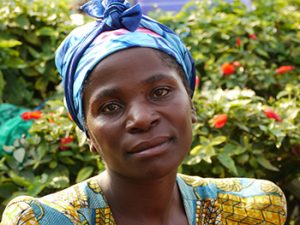
HEAL Africa
Every year, Washington organizations find new ways to help women worldwide receive a quality education, better healthcare, and more economic opportunities. Next month, Global Washington will celebrate these organizations.
Global Washington recently announced its Stand for Girls campaign, which encourages Washingtonians to support women and girls around the world during the month of September. The campaign will benefit ten Global Washington member organizations that have a special focus on women’s issues.
Women and girls have some very pressing needs. According to the United Nations, women comprise compromise 70 percent of the world’s poorest people and own only 1 percent of the title land. Historically, girls have been less likely to receive an education than boys. They also face special risks related to pregnancy and reproductive health. Yet despite the negative statistics, the news for girls worldwide is positive: more and more organizations are realizing how big a difference investing in girls can make. More and more people are speaking up in support of girls, making sure they are educated, healthy, and able to make a living.
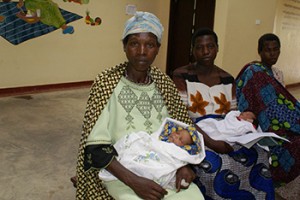
Imaging The World
The Stand for Girls campaign is a collaboration between Global Washington, Ayni Education International, Imaging the World, the Mona Foundation, OneWorld Now!, Richard’s Rwanda IMPUHWE, Lumana, One by One, Women’s Enterprises International, Upaya Social Ventures, and HEAL Africa. Together, these organizations hope to celebrate the ways that the lives of women and girls are improving and gain support for work that will continue to make a difference.
This campaign has three parts:
- Starting September 1st, Washingtonians are encouraged to give $12 to support these 10 specially-selected organizations who are leading the way in women’s education, healthcare, and economic development. Donations can be made online and by mobile phone.
- Go to a community event called GlobalFest, featuring 40 member organizations at the Seattle Center on Sept. 22, 2012 as part of the Seattle Center’s Next 50 celebration of innovations in Seattle’s economy
- Global Washington will help people all over Washington gather their friends and neighbors to host community events and house parties that focus on global women’s issues on October 11th, the Day of the Girl.
Stand with us. Stand for girls.
Back to Top
Feature
Washington organizations stand together for women and girls
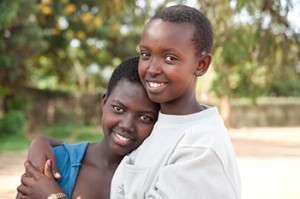
Richards Rwanda
When resources are limited and donors’ budgets are stretched, nonprofits may think that they have to compete against other worthy causes for every dollar. However, some Washington nonprofits are rejecting this competitive mentality and are instead finding new ways to do their work effectively, even with limited resources. The key? Collaboration.
In September, Global Washington is sponsoring an innovative venture called Stand for Girls 2012 that invites ten member organizations to join their resources, time, and ideas in order to raise awareness and funds to benefit women and girls worldwide. Our staff was pleasantly surprised when we held a meeting with representatives from participating organizations to talk about how to make this happen. “We want all of the proceeds to go into one fund, which will then be split evenly,” the organizations decided unanimously. “We don’t want to be siloed individually or by issue area. We think everyone in this room is doing wonderful work. We need each other to make a real difference for women and girls.”
The organizations represent a variety of development projects in numerous countries, across the issue areas of economic empowerment, health, and education for women and girls. All have relatively small budgets, but are high on innovation, impact, and community ownership. “Young girls can’t learn effectively without being healthy,” someone pointed out. “And healthy, educated women are better able to provide for themselves and their families. All of these areas are needed to really make a difference.”
This type of collaboration is one of the main reasons for Global Washington’s existence. The state of Washington is home to numerous nonprofits, businesses, universities, and individuals dedicated to making a difference in the lives of the world’s most vulnerable populations. Although they are doing quality work individually, we firmly believe that together they can be even more powerful. By sharing knowledge and resources, Washington organizations increase their effectiveness, make a greater impact in the communities where they work, and gain even more enthusiastic support for global development from Washington’s internationally-engaged citizenry.
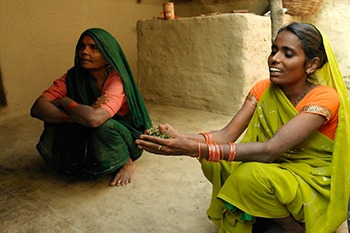
Upaya Social Ventures
Global Washington has chosen women and girls as the theme of this year’s annual campaign because investing in women and girls is an investment in our shared future. Women who are healthy, productive, and educated become change-makers in their own families and communities. Our member organizations recognize this fact and many have a special emphasis on supporting women. In the upcoming months, we hope you will visit our campaign website and find your opportunity to make a difference for women and girls globally–by giving our suggested $12 donation, by attending our GlobalFest community event on September 22nd, or by mobilizing your own community on October 11th to learn more about these issues and organizations. In doing so, you not only support ten effective organizations, but you also show your dedication to the collaborative spirit that is changing lives around the world.
Back to Top
Global Washington Conference 2012
Redefining Development: From Silos to Collective Impact
This year’s conference will focus on a new way of looking at development work that is inherently collaborative and comprehensive. Organizations from across sectors and issue areas can work together to address global problems holistically. Our conference will explore this emerging paradigm and give attendees opportunities to see it firsthand as they network with others in the field to share ideas and generate opportunities for collaboration.
Speakers will include:
- Dr. Sakena Yacoobi, Executive Director and Founder of the Afghan Institute of Learning, which has served over 9 million Afghans by providing education and health services to women and children
- Amir A. Dossal, Founder and Chairman of the Global Partnerships Forum, an international platform to address economic and social challenges through innovative partnerships.
- Raymond C. Offenheiser, President of Oxfam America.
Date:Thursday, December 6th, 2012
Location:Port Facilities/Cruise Terminal
Bell Harbor Conference Center
Seattle, WA
Price:$100 for members. $125 for nonmembers.
Register now to reserve your spot at the early bird price
Interested in presenting at the conference? Fast Pitch Storytelling
How is your organization redefining development by collaborating?
Do you have a story of an innovative collaboration to guide your organizational effectiveness? Do you have cutting edge strategies to deliver your programs collaboratively? Are you interested in sharing the story of your collective impact? Can you tell a compelling story and motivate people in 2 minutes?
If your answer is yes, and you are a current member of Global Washington, then please submit a short proposal following the application to be featured in the Global Washington 2012 Conference in the session titled: Fast Pitch Storytelling – How is your organization redefining development by collaborating?
Deadline: October 12th 2012.
Back to Top
Welcome New Members
Please welcome our newest Global Washington members. Take a moment to familiarize yourself with their work and consider opportunities for support and collaboration!
Vittana
We envision a world of opportunity, where educated minds and skillful hands work together to uplift the next generation, breaking the cycle of poverty. www.vittana.org
Individual Members
Monika Aring
Back to Top
Career Center
Highlighted career
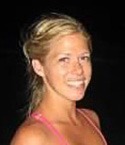 Name and Profile: Elise Ricci – Special Events Officer at Global Partnerships
Name and Profile: Elise Ricci – Special Events Officer at Global Partnerships
How would you describe your job? Fun and dynamic! I have several different projects that I work on at one time, most of them focused on Global Partnerships’ events. My job involves a variety of projects– like meeting with corporate partners to talk about sponsorships, coordinating logistics for an event, working on communications and print pieces, and meeting with my team to plan and set strategic direction for community engagement and fundraising. More.
Highlighted positions
Director of International Visitor Program – World Affairs Council
The Director of IVP oversees all program operations and leads a staff of three to successfully execute high-quality, high impact programming for visitors from all corners of the world in a wide array of fields. More.
Development Manager – Global Visionaries
Implement strategic annual fundraising plan in coordination with the Executive Director and Board Development Committee. Secure resources to support Global Visionaries’ general operating fund. Work with the ED to develop Global Visionaries’ fundraising strategy and the fund development program budget and implement successfully. More.
Youth Leadership Manager – One World Now
The Youth Leadership Manager (YLM) ensures the effective and efficient delivery of student support services, including recruitment and retention, while serving as main liaison between OWN, our students and their schools. The YLM will also co-facilitate leadership weekly leadership workshops using OWN’s unique leadership curriculum. More.
Highlighted Internships
Communications and Programs Intern – Seattle International Foundation
Primary Responsibilities: Communications and Events
– Assist in implementing SIF’s social media and communication strategy by identifying opportunities for greater outreach and public support of partners in the philanthropic and development sectors. More.
Marketing Intern – InterConnection
InterConnection is looking for a motivated and talented intern to work with the Marketing Lead to carry out external marketing, PR and donor related activities. The primary focus of this internship position is to make businesses aware of InterConnection’s surplus computer recycling and asset disposition service and increase computer donations to InterConnection. More.
Highlighted Volunteering Opportunity:
Marketing / Graphics Arts Committee – Literacy Bridge
For people who enjoy graphics arts and have design skills and the software tools to create and edit design documents. Activities will include: 1) developing and overseeing branding standards for Literacy Bridge; 2) designing print-ready collateral materials (such brochures, case studies), and; 3) developing design changes for the Talking Book’s interface and form. More.
For more jobs and resources, visit www.globalwa.org/resources/careers-in-development/
Back to Top
Announcements
Technology for the benefit of humanity: IEEE Global Humanitarian Technology Conference
IEEE GHTC is proud to announce that they are having their 2nd annual premier conference. This conference will provide an opportunity for locals involved in humanitarian projects to share their work. Come to meet other technologists; humanitarians; funders; and representatives from NGOs, government, academia who are involved in humanitarian technology.
The conference will feature a number of sessions that will address a vast array of topics. It will also feature companies in the medical and biotech industry as well as many other software companies.
Preliminary Conference Program: http://www.ieeeghtc.org/files/2012/01/Program-Table-072012.pdf
Keynote Speaker includes: http://www.ieeeghtc.org/event/keynote-speakers
When: October 21-24 2012
Where: Renaissance Seattle Hotel
515 Madison Street
Seattle, WA 98401
Registration is now open! Early Registration Discount by September 7, 2012 at www.ieeeghtc.org
Opportunities in Vietnam: A trade and investment discussion panel
The World Trade Center Tacoma’s speaker series announces a joint event with the Seattle Vietnamese Chamber of Commerce discussing Vietnam, one of Asia’s most dynamic economies. This event will feature an experienced panel of four diverse professionals as they discuss trade and investment opportunities in Vietnam. The panel will include former U.S. Ambassador to Vietnam and consultant to international trade Michael W. Michalak; Associate Professor of Economics at Seattle University Dr. Quan Vu Le; founder of Healing the Children and Co-founder to Education Exchange Dr. Rob Gertler; and Son Michael Pham who is principal of U.S – Asia Gateways, director for the Asia Injury Prevention Foundation (based in Viet Nam) and founding director of Kids Without Borders. Participants in the event will also enjoy an authentic Vietnamese meal at Thao’s Restaurant, free with admission.
When: August 24, 2012 from 11:30am-1:30 pm.
Cost: Admissions (including lunch) $25.00.
Where: Thao’s Restaurant
96 Union Street
Seattle, WA 98101
www.thoaseattle.com
To register for this event or find out more information regarding WTC Tacoma’s speaker series events please visit http://www.wtcta.org/connect/upcoming-events
Congressman Adam Smith hosts NGO roundtable meeting
Come join U.S. Representative Adam Smith at the Southwest King County Chamber of Commerce in Tukwila, WA as hosts a NGO Roundtable Meeting discussing the current developments in Congress.
When: Friday, August 31, 2012
11:00am-12:00 pm
Where: Southwest King County Chamber of Commerce Board Room
14220 Interurban Ave. South#134
Tukwila, WA 98168
For more information on this even or to RSVP, please contact Linh Thai:
Linh.Thai@mail.house.gov or (253)272-1488.
Upcoming workshops for small and medium-sized 501(c)(3) organizations
Come join the Internal Revenue Service(IRS) as they host a one-day workshop for small and medium- sized 501(c)(3) organizations. This workshop will feature an experienced panel of IRS Exempt Organization (EO) specialists that will explain the responsibilities of registered 501(c)(3) and what they must do in order to maintain their tax-exempt status and comply with tax obligations.
This workshop is perfect for administrators or volunteers who are responsible for tax compliance and represent 501(c)(3) organizations.
- Seattle, WA- September 12, 2012
Hosted by the University of Washington
The registration link is http://www.washingtonnonprofits.org/index.cfm?fuseaction=Calendar.eventDetail&eventID=60
- Spokane, WA- September 14, 2012
Hosted by Gonzaga University
The registration link is http://www.washingtonnonprofits.org/index.cfm?fuseaction=Calendar.eventDetail&eventID=58
Volunteer at Bumbershoot with Oxfam America
Oxfam America Action Corps Seattle is recruiting volunteers to staff a table at Bumbershoot over Labor Day weekend. The shifts are about 7 hours each and the rest of the time volunteers will be able to experience Bumbershoot free for the day they volunteer. The Oxfam Action Corps lead organizers will plan a short training session before the weekend begins to support and provide all of the necessary tools to be a successful volunteer and represent Oxfam at this outreach opportunity. When you sign up, please provide your phone number and email address to ensure that you know of the training session date and time and to receive the vendor admissions pass to Bumbershoot. If you would like to volunteer with a friend and the times do not coordinate exactly, please indicate also what times you would like to partner at the outreach table. Sign up to volunteer HERE.
IDRI
The Infectious Disease Research Institute (IDRI) and Medicago were recently authorized by the FDA to begin a clinical trial for an H5N1 Avian Influenza VLP vaccine candidate (“H5N1 vaccine”). This marks a significant milestone in developing flu vaccine that could be used rapidly should we experience a pandemic flu outbreak. The trial will test the safety and immunogenicity of the H5N1 vaccine, combined with IDRI’s Glucopyranosyl Lipid A (“GLA”) adjuvant. This is considered the first human test of an intradermal adjuvant, a technology that could have widespread vaccination benefits worldwide even beyond this particular trial. The resulting vaccine could potentially be self-administered in case of a pandemic. Congratulations to IDRI for this achievement!
OneWorld Now! is turning ten!
Join OneWorld Now for a birthday celebration on September 21st! This fun event will celebrate OneWorld Now’s 10 years of innovative global leadership programming for underserved youth and will take place at the Space Needle at 6:30pm. Tickets are $75 and will include, food, drinks, and a trip to the top of the Space Needle. Register or email events@oneworldnow.org for more information.
Security frameworks workshop
In the last several years we have seen an increase in insecurity in the field. Correspondingly, organizations have had to increasingly curtail their programs due to that insecurity. Many have responded by acknowledging the need to develop a risk management system to manage risk to staff and programs. This event, spearheaded by PATH, will bring InterAction and its members on the West Coast together to discuss a systematic approach to risk management, Minimum Operating Security Standards (MOSS) and developing an agency wide Security Framework.
This workshop will be held at PATH on September 25th starting at 8:30am. Registration is by invitation, but if you are interested in someone from your organization attending, please contact Dan Bryant (dbryant@path.org, 206-285-3500) for further information.
Clark Nuber presents board governance workshop
Please join Clark Nuber for an annual governance conference which is organized into three tracks – Board Governance (Track A), Executive Leadership (Track B), and New Directors (Track C) – to specifically address the issues of interest to those groups. Following the Keynote Speech to open the conference, there will be concurrent breakout sessions throughout the day facilitated by Clark Nuber professionals along with experienced not-for-profit and business professionals from well respected organizations in our community, including: Jurassic Parliament, Institute for Systems Biology, World Vision, Housing Hope, Pioneer Human Services, Davis Wright Tremaine, Cornerstone Advisors, and The Rainier Club.
Location: The Meydenbauer Center
11100 NE 6th Street
Bellevue, WA 98004
Time: 7:30 am to 3:30 pm
Date: October 16, 2012
Cost: $125
Register: http://www.regonline.com/builder/site/Default.aspx?EventID=1130544
Support Lumana by attending fundraising dinner and auction
Lumana’s fall benefit dinner and silent auction will take place on September 27th! Lumana has been serving the poor in rural Ghana since 2007 and recently expanded its program to include a total of 700 clients. Support Lumana by attending this inspiring event, or giving a donation if you cannot attend. For more details, visit: http://www.lumana.org/get-involved/donate
Seattle International Foundation announces call for applications under 2012 Global Program
The Seattle International Foundation (SIF) is accepting applications under its Global Program beginning September 1st. The Global Program (small grants for local organizations) supports and fosters local organizations working internationally. SIF is interested in development projects in all regions of the world.
This round of the Global Program will give preference to organizations based in the greater Puget Sound region working with women and girls in the developing world. Grant recipients will be announced at SIF’s third annual Women in the World breakfast event in mid-November. Please stay tuned for details about this event. Learn about the 2011 breakfast.
The Global Program is open to 501(c)3 organizations, or those with fiscal sponsorship, with an annual organizational or project budget of less than $2 million (USD). Preference will be given to organizations based in the greater Puget Sound region; organizations based outside of Washington State are not eligible. The program seeks to support organizations launching new projects, or working to establish or expand an international project or program.
For more information on how to apply, please visit www.seaif.org, or contact Michele Frix (Program Officer) at mfrix@seaif.org.
Back to Top
Global Washington Events
Saturday, September 22
GlobalFest 2012: Stand for Girls
December 6, 2012
GlobalWA Conference 2012
Back to Top
Other Events
Wednesday, August 22
Next 50 Film Series & Discussion on Education Finding Joe followed by post-film discussion on education policy
Thursday, September 6
Dave Valle Charity Golf Classic
Tuesday, September 11
Everett Roundtable: Washington State International Competitiveness Strategy
Wednesday, September 19
Proposal Writing 201: Advanced tools for getting your project funded
Friday, September 21
Own It! Celebrating Youth in Global Leadership
Celebrate Ten Years of OWN’s Innovative Leadership!
Saturday, September 22
Women in Innovation Summit 2012
Thursday, September 27
Lumana’s 4th Annual Benefit Dinner and Silent Auction
Tuesday, October 2
Diverse Landscapes of Iceland: Photography by Bill Stafford
Thursday, October 4
Announcing the Center for Impact & Innovation!
Tuesday, October 16
Financial Management: Best practices for managing your organization`s finances
Global Partnerships: Business of Hope Luncheon
Sunday, October 21
IEEE Global Humanitarian Technology Conference (GHTC)
Monday, October 22
IEEE Global Humanitarian Technology Conference (GHTC)
Tuesday, October 23
IEEE Global Humanitarian Technology Conference (GHTC)
Wednesday, October 24
IEEE Global Humanitarian Technology Conference (GHTC)
Saturday, October 27
14th Annual Africa Day Business Forum
Sunday, October 28
SAVE THE DATE: Smiles Forever 12th Annual Live-Auction Fundraiser
Contributors: Megan Boucher, Daniel Drake, Leen Hibri, Amina Pasha, Prajwol Shrestha
Editor: Megan Boucher
Back to Top
Tuberculosis vaccine candidate to prevent disease enters clinical testing
Posted on August 23, 2012.
Phase I study in Lenexa, KS, of novel vaccine targeting TB virulence and latency
Seattle, WA | August 22, 2012
Aeras and the Infectious Disease Research Institute (IDRI) announce today the start of the first clinical trial of IDRI’s novel tuberculosis vaccine candidate, ID93 + GLA-SE. The Phase I clinical trial will assess the safety, tolerability and immunogenicity of the vaccine candidate in 60 healthy adult volunteers. The study will be conducted by Johnson County Clin-Trials in Lenexa, Kansas, in close collaboration with Aeras and IDRI.
Tuberculosis (TB), which kills more people than any other infectious disease except HIV, has orphaned 10 million children, and costs the global economy an estimated $1 billion every day. An increasing number of diagnosed multidrug-resistant TB cases are making the disease more difficult to control and multiplying the cost and time it takes to treat patients, which can take two years or longer for multidrug-resistant TB.
The vaccine candidate targets both active tuberculosis, which makes nearly 9 million people sick each year, and latent TB, which lies dormant in one-third of the world’s population and reactivates when their immune systems are compromised.
“An effective TB vaccine for adolescents and adults would be the single most cost-effective intervention against tuberculosis,” said Tom Evans, Aeras Chief Scientific Officer. “With cases of drug-resistant TB on the rise, it is urgent to deliver an effective TB vaccine regimen to those who need it as soon as possible.”
The vaccine candidate, ID93 + GLA-SE, is composed of a recombinant fusion-protein antigen designed by IDRI to recognize both active and latent TB, plus IDRI’s proprietary adjuvant, GLA-SE, which has been previously tested in humans. In pre-clinical studies, the vaccine candidate had an acceptable safety profile in animals and demonstrated substantial protection against Mycobacterium tuberculosis – the bacterium that causes TB.
“With NIH support enabling our TB program, IDRI has designed and tested the safety and efficacy of this vaccine candidate in several pre-clinical models,” said Steven Reed, Ph.D., IDRI president, founder and Chief Scientific Officer. “The start of the first clinical trial is a significant milestone following nearly seven years of work on this vaccine candidate, which is designed to produce a robust immune response to prevent, and possibly to treat, TB.”
The currently available TB vaccine, Bacille Calmette-Guérin (BCG), developed 90 years ago, reduces the risk of severe forms of TB in early childhood but has been ineffective in controlling the global TB epidemic despite widespread use. Aeras and IDRI, two non-profit product development partnerships, are committed to making new TB vaccines available to those who need them most in TB endemic countries.
Contacts:
IDRI: Lee Schoentrup | 206.518.6290 | lee.schoentrup@idri.org
IDRI and Medicago Announce FDA Authorization to Initiate a Phase 1 Clinical Trial for an H5N1 Vaccine with GLA Adjuvant
Posted on August 17, 2012.
The Infectious Disease Research Institute (IDRI), a Seattle-based non-profit research organization that is a leading developer of adjuvants used in vaccines combating infectious disease, and Medicago Inc. (TSX: MDG; OTCQX: MDCGF), a biopharmaceutical company focused on developing highly effective and competitive vaccines based on proprietary manufacturing technologies and Virus-Like Particles (VLPs), announce that they have been cleared by the U.S. Food and Drug Administration (FDA) to initiate a Phase 1 clinical trial for an H5N1 Avian Influenza VLP vaccine candidate (“H5N1 vaccine”). This is an important step toward development of an influenza vaccine that could be rapidly and widely administered in case of a pandemic flu outbreak. The trial is focused on evaluating the safety and immunogenicity of the H5N1 vaccine, combined with IDRI’s Glucopyranosyl Lipid A (“GLA”) adjuvant, which will be administered intramuscularly or intradermally. Each study participant in the trial will receive two doses of a given formulation in order to collect and compare data.
The trial is believed to be the first human test of an intradermal adjuvant – a technology platform that could potentially benefit a number of worldwide vaccination programs – and could result in a vaccine that could be self-administered in case of a pandemic. “A massive flu outbreak would cause a strain on health care centers as people rush to get a vaccination,” said Darrick Carter, Ph.D., Vice President of IDRI’s Adjuvant Technology program and co-principal investigator for the project. “Our idea is to ultimately produce a one-dose vaccine that you could give yourself – imagine a flu vaccine that you can easily administer using a simple, painless microneedle device arriving in your mailbox.”
“This research collaboration may provide for expedited vaccination and greater ease of use in the event of an influenza pandemic,” said Andy Sheldon, President and Chief Executive Officer of Medicago. “We view our collaboration with IDRI on this important initiative as a testament to the quality and efficacy of our H5N1 Influenza VLP vaccine. We look forward to now combining our vaccine candidate with IDRI’s adjuvant and the microneedle technology. Together, these three technologies could enhance protection, reduce the amount of product required, and simplify vaccine distribution and administration.”
According to the Centers for Disease Control and Prevention, the highly pathogenic avian influenza A (H5N1) virus is a deadly virus that occurs mainly in birds including domestic poultry. Though relatively rare, sporadic human infections with this virus have occurred and caused serious illness and death. Because of the unpredictability of pandemic flu, efforts are being made to create and stockpile a vaccine to combat H5N1 that reduces the amount of vaccine needed per person and can be easily administered.
“The predicted efficacy of a pandemic influenza vaccine is directly related to three key components: the nature of the vaccine, the way the vaccine is administered, and the presence or absence of a given adjuvant,” said Steven Reed, Ph.D., IDRI’s President, Founder and Chief Scientific Officer, and co-principal investigator for the project. “IDRI’s adjuvants can be used to increase the number of available vaccine doses by reducing the amount of vaccine needed per individual – this is called ‘dose sparing.’ Combining our adjuvant technology with Medicago’s rapid VLP technology is key to the next generation of flu vaccines, as well as an innovative delivery method from NanoPass. This gives us a great platform to test.”
The H5N1 vaccine candidate includes IDRI’s GLA adjuvant and is produced in Medicago’s plant-based expression system, which is speedier than the traditional route of producing flu vaccines in eggs. The adjuvant system has been successfully combined with Medicago’s vaccine candidate and other recombinant protein antigens to elicit both humoral and cell-mediated immune responses associated with protection in pathogenic animal challenge models. In animal studies, GLA has also been shown to expand the cross reactivity of antibodies induced by the H5N1 vaccine to other potential pandemic influenza strains such as H2N2.
The Phase 1 clinical trial is expected to start in September 2012, and will enroll 100 healthy adult volunteers, ages 18-49 years, at three locations in the U.S., testing for safety and immune response. The trial is anticipated to take 15 months to complete, and initial safety and immunology data are expected in the first quarter of 2013. It is funded by a multi-million dollar grant IDRI received from the Defense Advanced Research Projects Agency (DARPA), a division of the United States Department of Defense, to develop an influenza vaccine for pandemic flu.
While the trial will include testing of the traditional intramuscular route of delivery for comparison purposes, NanoPass’ proprietary MicronJet600™ microneedle device will test the intradermal route that could further improve immunogenicity. “Intradermal injection may have advantages over the intramuscular route in that the injection is painless, needle-free, and potentially more immunogenic as it provides targeted delivery of the vaccine to specialized cells of the immune system,” said Yotam Levin, M.D., Chief Executive Officer of NanoPass. “We have demonstrated in a recent Phase 2 study that we actually improve the immune response of seasonal flu vaccines in the elderly, despite using only 20% of the dose. This is an enabling technology that allows reducing the dose of antigens and/or adjuvants, improving the vaccination effect and at the same time improving patient comfort and compliance, making it an attractive proposition for pandemic preparedness.”
In June 2011, Medicago reported positive final results from its Phase 2 human clinical trial with its H5N1 vaccine with an alum adjuvant. Healthy volunteers in the Phase 2 trial received two doses 21 days apart, and data were analyzed 21 days after the last dose. The vaccine induced a solid immune response and was found to be safe and well-tolerated. The H5N1 vaccine has been tested in over 200 healthy volunteers to date, none of whom experienced any serious adverse reactions.
Contacts:
IDRI: Lee Schoentrup | 206.518.6290 | lee.schoentrup@idri.org
Global Workers Series #3: Launching Your Career in Global Health
Posted on August 1, 2012.
On Thursday July 26th, Global Washington hosted a Global Worker Series event on Global Health at iLeap. Speakers from PATH and I-TECH came to discuss hiring processes in the field and gave advice to those looking to go into global health work.
PATH is an international organization based in Seattle that, “transforms global health through innovation.” With more than 1,000 employees worldwide, they have diverse opportunities for employees within their organization. They have a very human as well as global impact as, for example, they bring vaccines more quickly and more cheaply to the developing world, partner with similar organizations to work toward common goals, and cross-cut solutions between health and socio-economic conditions to create lasting change.
Richard Wilkinson, HR Director for the International Training and Education Center for Health (I-TECH), shared with us his personal experience getting a position in the Global Health field when he transitioned to a new career in his fifties. He encouraged those looking into careers in global health to aim for the “sweet spot” of what you love, what you’re great at, and what needs doing before looking for a unique position in the field. He shared that global health needs workers that have two-fold skills: they have technical understanding of the socio-environmental determinacy of health as well as the interpersonal skills to work in a field where you cannot accomplish your goals on your own.
Jenna Herron, Recruiting Director for HR at PATH, and SaraBeth Ross, Global Recruiting Coordinator at PATH, both shared their personal experience of finding a position at PATH and gave insights on how PATH finds their employees. They look for applicants with easily transferrable skills, and those who have field experience along with skilled experience.
All of the speakers encouraged those seeking careers in global health to make connections and network as much as possible. As Jenna advised, the path to a career in global health can be a “hop, skip, and a jump” away through other positions and fields as you make connections. PATH hosts a Community Coffee Quarterly that all recruiters attend, which could be a great place to network and learn more about the field of global health. (The next event is on August 30th at 8am.)
Global Washington’s Careers in Global Development Center on our website offers opportunities for job seekers to find the best position in the global development sector, available from Washington State. Whether it’s a paid position, internship, or training opportunity that you’re looking for, the Careers in Global Development Center is an open resource to help you find it. Please visit us at: https://globalwa.org/resources/careers-in-development/


 Greetings,
Greetings,




 “As you look for solutions for one problem, you come up against the next challenge.” This is perhaps the most succinct way to explain Dave Richter’s varied, trans-continental professional career. As a child, Richter spent his days tracking his father’s travels across the globe. A Project Evaluator, and later Deputy Director in Kenya for the Peace Corps, Richter’s father traveled frequently, and his children were quickly instilled with a sense of a world outside their own front door. This awareness has guided Richter’s professional life ever since. From his elementary education in Kenya to his post-collegiate study of Chinese in China and Taiwan, Richter has sought solutions to puzzles, answers to difficult questions, and acknowledgement of a common human purpose for all of us.
“As you look for solutions for one problem, you come up against the next challenge.” This is perhaps the most succinct way to explain Dave Richter’s varied, trans-continental professional career. As a child, Richter spent his days tracking his father’s travels across the globe. A Project Evaluator, and later Deputy Director in Kenya for the Peace Corps, Richter’s father traveled frequently, and his children were quickly instilled with a sense of a world outside their own front door. This awareness has guided Richter’s professional life ever since. From his elementary education in Kenya to his post-collegiate study of Chinese in China and Taiwan, Richter has sought solutions to puzzles, answers to difficult questions, and acknowledgement of a common human purpose for all of us.

 Richter first became involved with the Tabitha Foundation in 2004, and described his first experience building houses in Cambodia as “like coming home.” The work, he says, is what he “was meant to do.” Richter has led building trips to Cambodia each year since then, and his children have traveled to Cambodia four times each. Tabitha has several different projects, and each has developed as an organic offshoot of an earlier project. Initially, the founders began Tabitha as a savings program; one of the most devastating outcomes of the Pol Pot regime was that ordinary Cambodians lost their sense of a future. Few people saved money or even held out hope that they would live to see the next day. This “lingering trauma of disbelief of the future” has prevented many Cambodians from rebuilding their lives even after the Khmer Rouge’s downfall. One of Tabitha’s initial goals was to reinstate that sense of hope and trust in the future through a microsavings program. Rather than save up to buy land or even a television, people in remote villages set aside a few cents per week to buy dishes, fishing nets, or cooking pots. Janne Ritskes, Tabitha’s founder, also set up a cottage industry for Cambodian women, reviving a traditional art in producing silk and giving them an outlet to sell their products. Since many women have small children and cannot always afford to leave the house all day, and because employment opportunities for women in Cambodia are frequently limited, job training for women in remote villages is crucial to their survival. Women employed in the cottage industry support themselves and their families through their skills.
Richter first became involved with the Tabitha Foundation in 2004, and described his first experience building houses in Cambodia as “like coming home.” The work, he says, is what he “was meant to do.” Richter has led building trips to Cambodia each year since then, and his children have traveled to Cambodia four times each. Tabitha has several different projects, and each has developed as an organic offshoot of an earlier project. Initially, the founders began Tabitha as a savings program; one of the most devastating outcomes of the Pol Pot regime was that ordinary Cambodians lost their sense of a future. Few people saved money or even held out hope that they would live to see the next day. This “lingering trauma of disbelief of the future” has prevented many Cambodians from rebuilding their lives even after the Khmer Rouge’s downfall. One of Tabitha’s initial goals was to reinstate that sense of hope and trust in the future through a microsavings program. Rather than save up to buy land or even a television, people in remote villages set aside a few cents per week to buy dishes, fishing nets, or cooking pots. Janne Ritskes, Tabitha’s founder, also set up a cottage industry for Cambodian women, reviving a traditional art in producing silk and giving them an outlet to sell their products. Since many women have small children and cannot always afford to leave the house all day, and because employment opportunities for women in Cambodia are frequently limited, job training for women in remote villages is crucial to their survival. Women employed in the cottage industry support themselves and their families through their skills. Richter also serves on the Board of Directors of the Hamomi Children’s Centre in Kenya, an organization that provides comprehensive care for orphaned and vulnerable children living in the slums of Nairobi. Through their primary school and scholarship program, they provide education for those children who would otherwise not have access to it. By providing food, medical care and job opportunities, they take into account outside influences which interfere with impoverished students’ education. This means their students receive immediate benefits from attending school, are better able to concentrate in class, have stronger immune systems and as a result score higher on tests. Although the organization is still young, it is already proving invaluable to the more than 140 children it serves.
Richter also serves on the Board of Directors of the Hamomi Children’s Centre in Kenya, an organization that provides comprehensive care for orphaned and vulnerable children living in the slums of Nairobi. Through their primary school and scholarship program, they provide education for those children who would otherwise not have access to it. By providing food, medical care and job opportunities, they take into account outside influences which interfere with impoverished students’ education. This means their students receive immediate benefits from attending school, are better able to concentrate in class, have stronger immune systems and as a result score higher on tests. Although the organization is still young, it is already proving invaluable to the more than 140 children it serves. My next interview was with
My next interview was with 



 Across rugged terrain in the mountainous region of Lempira, Honduras, men and women carry heavy pipes uphill to a water source, dig trenches for miles, and link and secure each section, forming a long silvery snake through which clean water will flow to kitchens in their homes. Elsewhere, another group replants the heavily deforested land to protect their watershed and this most vital and treasured of resources: water.
Across rugged terrain in the mountainous region of Lempira, Honduras, men and women carry heavy pipes uphill to a water source, dig trenches for miles, and link and secure each section, forming a long silvery snake through which clean water will flow to kitchens in their homes. Elsewhere, another group replants the heavily deforested land to protect their watershed and this most vital and treasured of resources: water. Communities that would like COCEPRADIL to help them gain access to clean water must provide the time and labor. (One recent project serving 300 people took 20,000 hours of hard work.) Two adults from each household in the community must also commit to five weeks of full time training on sanitation and water management. Once the community agrees to these conditions, COCEPRADIL will approve the work. The community then becomes part of COCEPRADIL and participates in community meetings, serves on the board and pays a small water-access bill, the proceeds of which are used to train community members.
Communities that would like COCEPRADIL to help them gain access to clean water must provide the time and labor. (One recent project serving 300 people took 20,000 hours of hard work.) Two adults from each household in the community must also commit to five weeks of full time training on sanitation and water management. Once the community agrees to these conditions, COCEPRADIL will approve the work. The community then becomes part of COCEPRADIL and participates in community meetings, serves on the board and pays a small water-access bill, the proceeds of which are used to train community members. Ramos has only one more year to serve as president, but he’s not going to stop working with COCEPRADIL. He is committed to continuing the work, regardless of the hardship. “We are in this fight to continue improving. Our goal is to satisfy the needs in the Zona Sur South Zone, then the department of Lempira, to have water and sanitation in each house. We are achieving this little by little, but there is still a lot that needs to be done. Unfortunately, the systems are expensive now. Water sources are miles away from the communities, and that prevents us from being able to do things in less time.”
Ramos has only one more year to serve as president, but he’s not going to stop working with COCEPRADIL. He is committed to continuing the work, regardless of the hardship. “We are in this fight to continue improving. Our goal is to satisfy the needs in the Zona Sur South Zone, then the department of Lempira, to have water and sanitation in each house. We are achieving this little by little, but there is still a lot that needs to be done. Unfortunately, the systems are expensive now. Water sources are miles away from the communities, and that prevents us from being able to do things in less time.” Name and Profile: Abby Stepaniak. Program Officer, International Visitor Program, World Affairs Council
Name and Profile: Abby Stepaniak. Program Officer, International Visitor Program, World Affairs Council



 Name and Profile: Elise Ricci – Special Events Officer at Global Partnerships
Name and Profile: Elise Ricci – Special Events Officer at Global Partnerships